THE MESSENGER
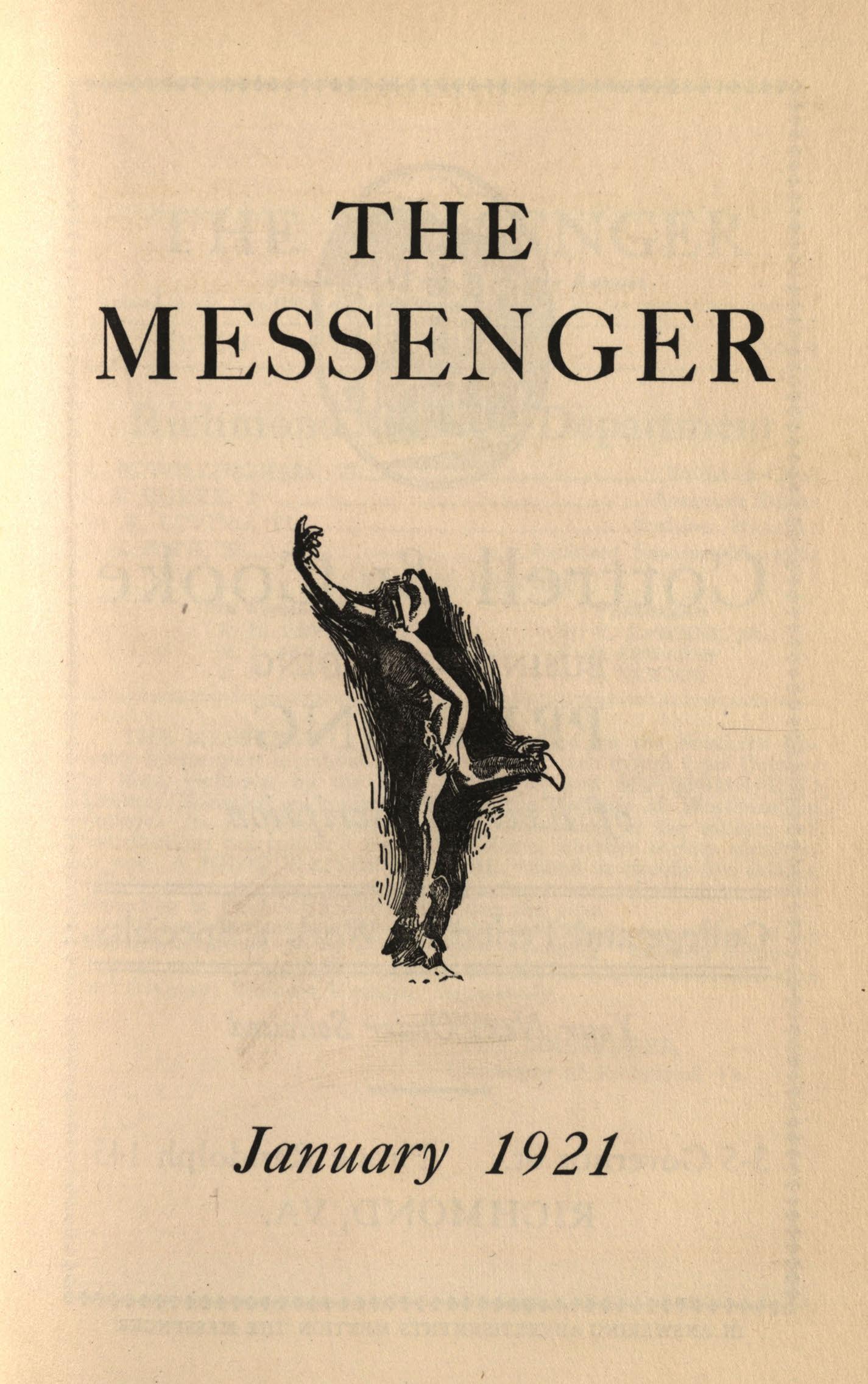
January 19 21
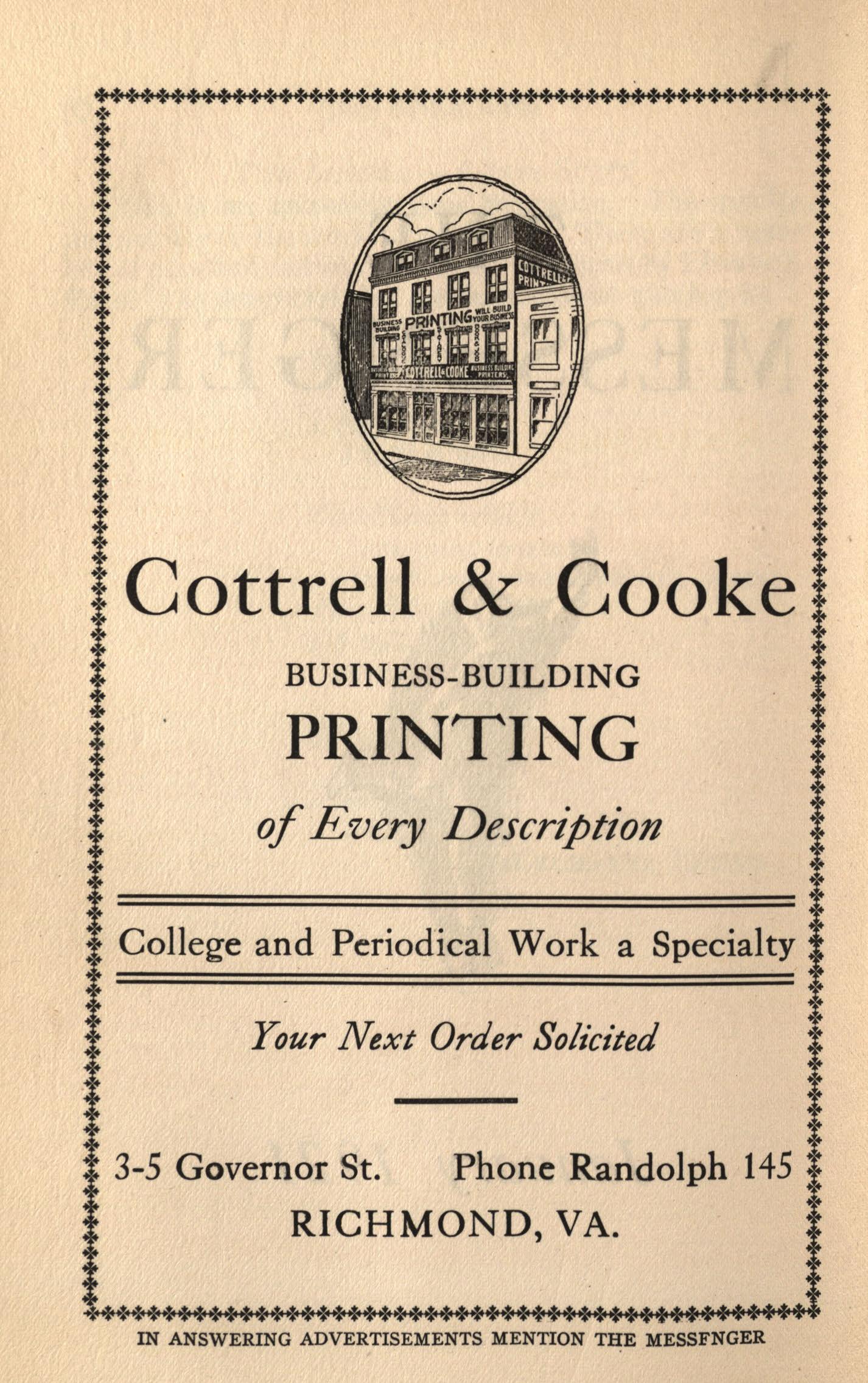


January 19 21

Subacription Price $1.SOPer Annum
Entered at the PO!lt Office at University of Richmond, Va., as second-class matter.
VOL. XLVIII J ANDARY, . 1921 No. 4
E. B. WILLINGHAM, '2L _____________________________Editor-in-Chicf
K. E. BURKE, '21 _____________________________________Assistant Editor
W. R. LOVING, '2L ________________________________Business Manager
0. L. HITE, '22____________________________Assistant Business Manager
ASSOCIATE EDITORS
Mu Siirma Rho
P. H. DAVIS
M. L. SKAGGS
B. U. DAVENPORT

Philoloirian
W. E. HATCHER, JR.
R. F. EDWARDS
C. W. NEWTON
THE MESSENGER (founded 1878; named for the Southern Literary Messenger) is published on the 15th of each month from October to May, inclusive, by the PHILOLOGIAN and MU SIGMA RHO Literary Societies, in conjunction with the students of Westhampton College. Its aim is to foster literary composition in the college, and contributions are solicited from all students, whether society members or not. A JOINT WRITER'S MEDAL, valued at twenty-five dollars, will be given by the two societies to the writer of the best article appearing in THE MESSENGER during the year. All contributions should be handed to the department editors or the Editor-in-Chief by the 1st of the month preceding. Business communications and subscriptions should be directed to the Business Manager and Assistant Business Manager, respectively.
Address-
THE MESSENGER, University of Richmond, Va.
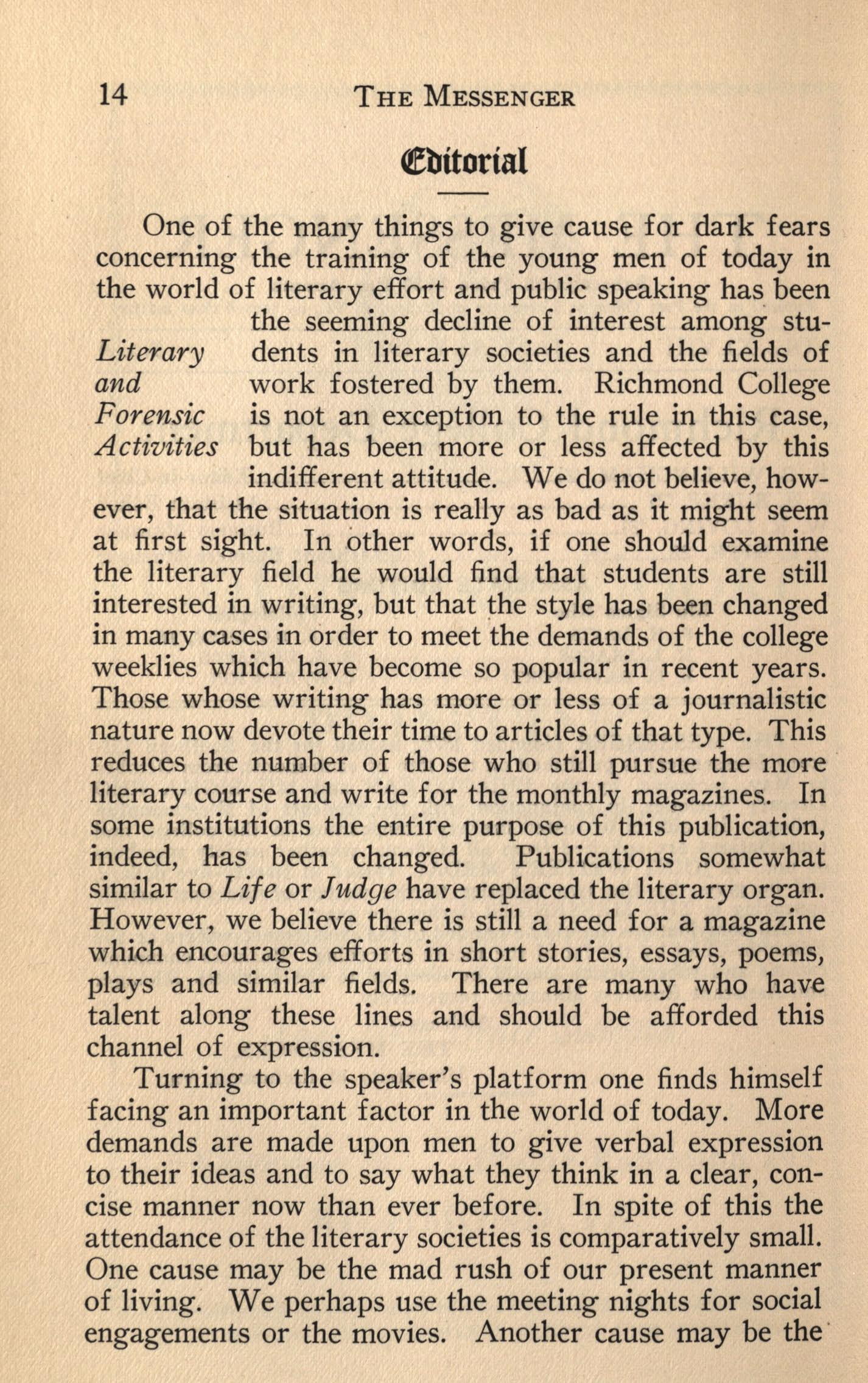
One of the many things to give cause for dark fears concerning the training of the young men of today in the world of literary effort and public speaking has _ been Literary and Forensic Activities the seeming decline of interest among students in literary societies and the fields of work fostered by them. Richmond College is not an exception to the rule in this case, but has been more or less affected by this indifferent attitude. We do not believe, however, that the situation is really as bad as it might seem at first sight. In other words, if one should examine the literary field he would find that students are still interested in writing, but that the style has been changed in many cases in order to meet the demands of the college weeklies which have become so popular in recent years. Those whose writing has more or less of a journalistic nature now devote their time to articles of that type. This reduces the number of those who still pursue the more literary course and write for the monthly magazines. In some institutions the entire purpose of this publication, indeed, has been changed. Publications somewhat similar to Life or Judge have replaced the literary organ. However, we believe there is still a need for a magazine which encourages efforts in short stories, essays, poems, plays and similar fields. There are many who have talent along these lines and should be afforded this channel of expression.
Turning to the speaker's platform one finds himself facing an important factor in the world of today. More demands are made upon men to give verbal expression to their ideas and to say what they think in a clear, concise manner now than ever before. In spite of this the attendance of the literary societies is comparatively small. One cause may be the mad rush of our present manner of living. We perhaps use the meeting nights for social engagements or the movies. Another cause may be the ·
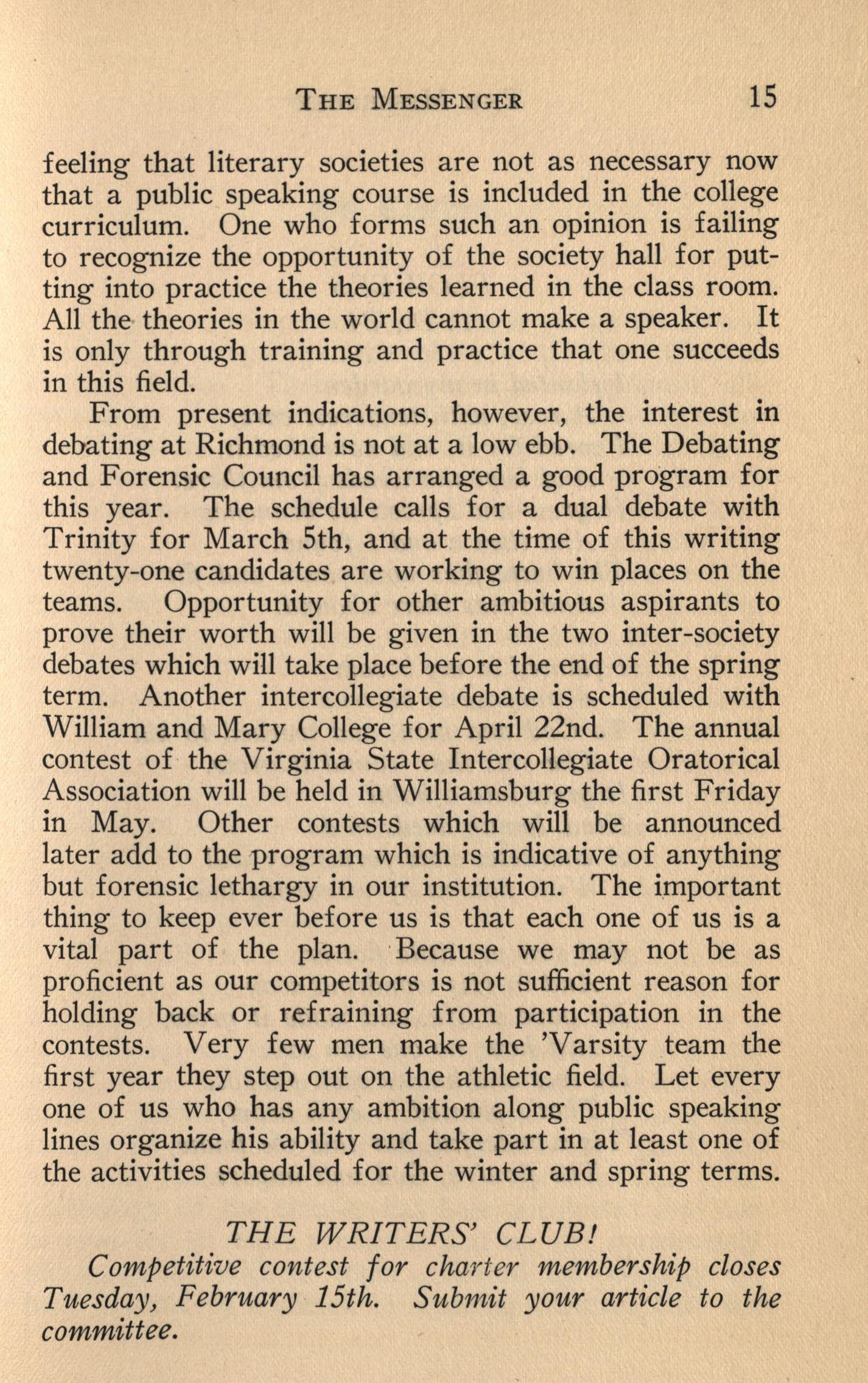
feeling that literary societies are not as necessary now that a public speaking course is included in the college curriculum. One who forms such an opinion is failing to recognize the opportunity of the society hall for putting into practice the theories learned in the class room. All the theories in the world cannot make a speaker. It is only through training and practice that one succeeds in this field.
From present indications, however, the interest in debating at Richmond is not at a low ebb. The Debating and Forensic Council has arranged a good pro ·gram for this year. The schedule calls for a dual debate with Trinity for March 5th, and at the time of this writing twenty-one candidates are working to win places on the teams. Opportunity for other ambitious aspirants to prove their worth will be given in the two inter-society debates which will take place before the end of the spring term. Another intercollegiate debate is scheduled with William and Mary College for April 22nd. The annual contest of the Virginia State Intercollegiate Oratorical Association will be held in Williamsburg the first Friday in May. Other contests which will be announced later add to the program which is indicative of anything but forensic lethargy in our institution. The i.mportant thing to keep ever before us is that each one of us is a vital part of the plan. ·Because we may not be as proficient as our competitors is not sufficient reason for holding back or refraining from participation in the contests. Very few men make the 'Varsity team the first year they step out on the athletic field. Let every one of us who has any ambition along public speaking lines organize his ability and take part in at least one of the activities scheduled for the winter and spring terms.
Competitive contest for charter membership closes Tuesday, February 15th. Submit your article to the committee.
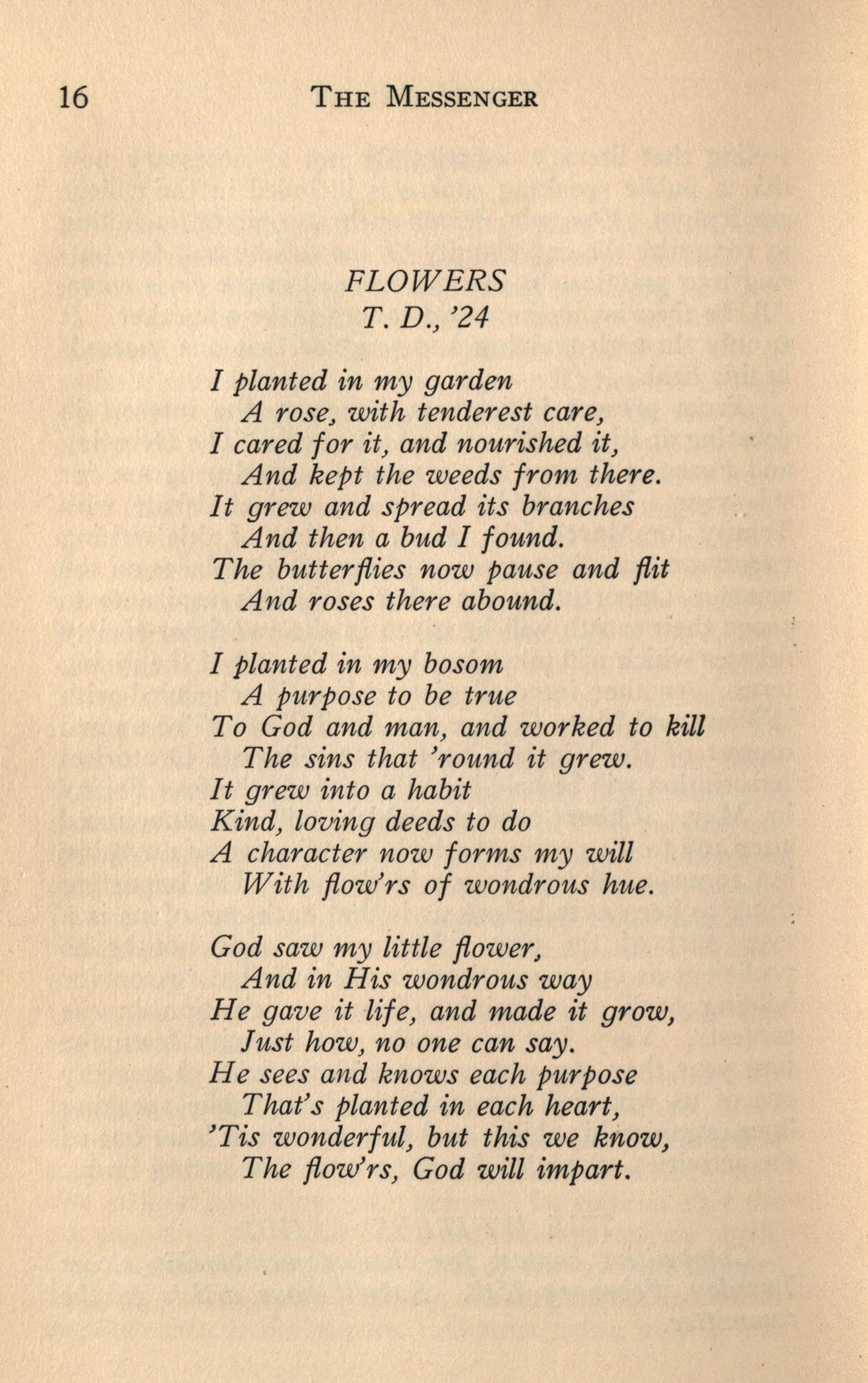
I planted in my garden
A rose, with tenderest care, I cared for it, and nourished it, And kept the weeds from there. It grew and spread its branches And then a bud I found. The butterflies now pause and flit And roses there abound.
I planted in my bosom
A purpose to be true
To God and man, and worked to kill The sins that 'round it grew. It grew into a habit Kind, loving deeds to do A character now forms my will With flow'rs of wondrous hue.
God saw my little flower, And in His wondrous way He gave it life, and made it grow, Just how, no one can say. He sees and knows each purpose That's planted in each heart, 'Tis wonderful, but this we know, The flow'rs, God will impart.
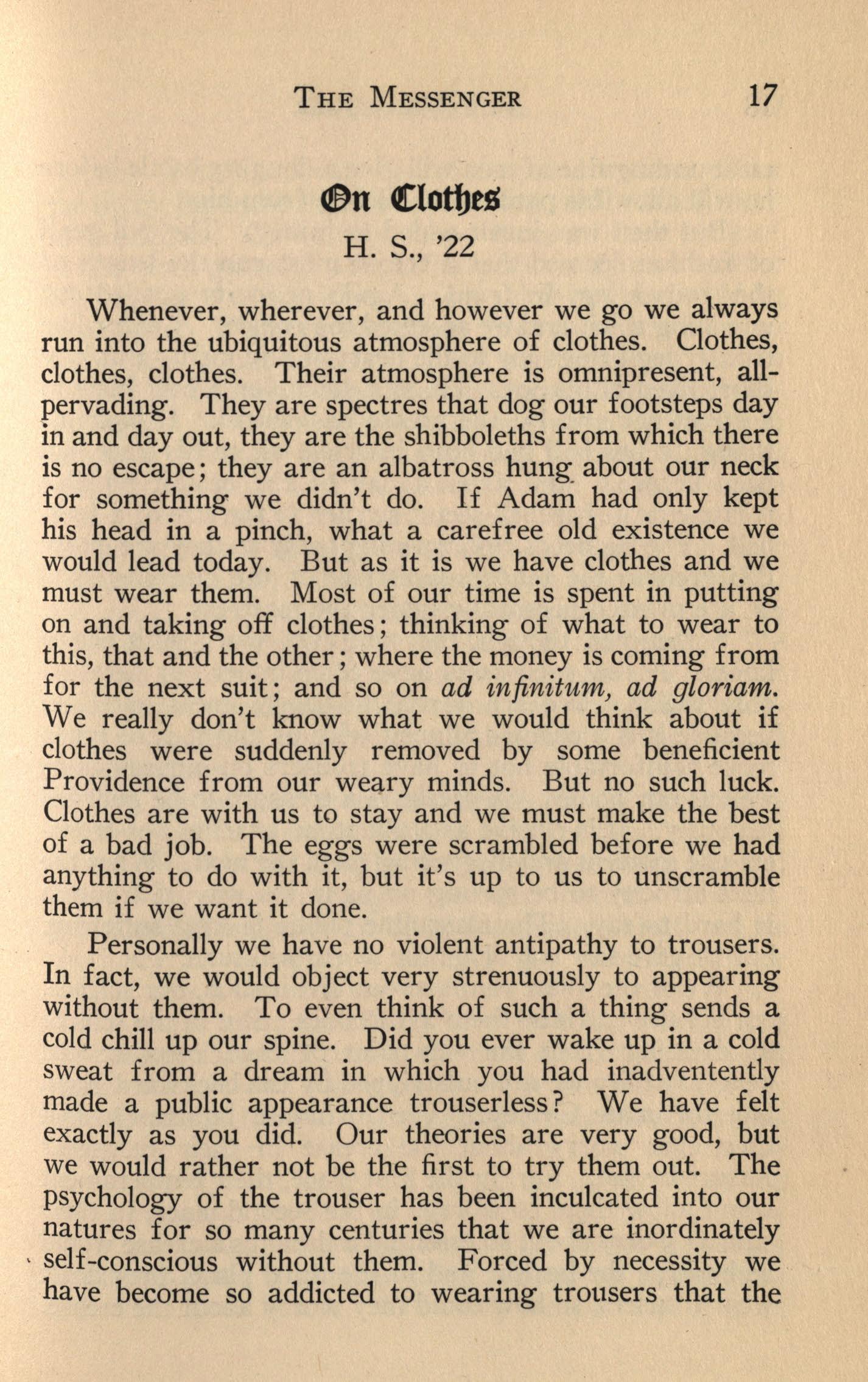
Whenever, wherever, and however we go we always run into the ubiquitous atmosphere of clothes. Clothes, clothes, clothes. Their atmosphere is omnipresent, allpervading. They are spectres that dog our footsteps day in and day out, they are the shibboleths from which there is no escape; they are an albatross hung about our neck for something we didn't do. If Adam had only kept his head in a pinch, what a carefree old existence we would lead today. But as it is we have clothes and we must wear them. Most of our time is spent in putting on and taking off clothes; thinking of what to wear to this, that and the other; where the money is coming from for the next suit; and so on ad infinitum, ad gloriam. We really don't know what we would think about if clothes were suddenly removed by some beneficient Providence from our weary minds. But no such luck. Clothes are with us to stay and we must make the best of a bad job. The eggs were scrambled before we had anything to do with it, but it's up to us to unscramble them if we want it done.
Personally we have no violent antipathy to trousers. In fact, we would object very strenuously to appearing without them. To even think of such a thing sends a cold chill up our spine. Did you ever wake up in a cold sweat from a dream in which you had inadventently made a public appearance trouserless? We have felt exactly as you did. Our theories are very good, but we would rather not be the first to try them out. The psychology of the trouser has been inculcated into our natures for so many centuries that we are inordinately · self-conscious without them. Forced by necessity we have become so addicted to wearing trousers that the
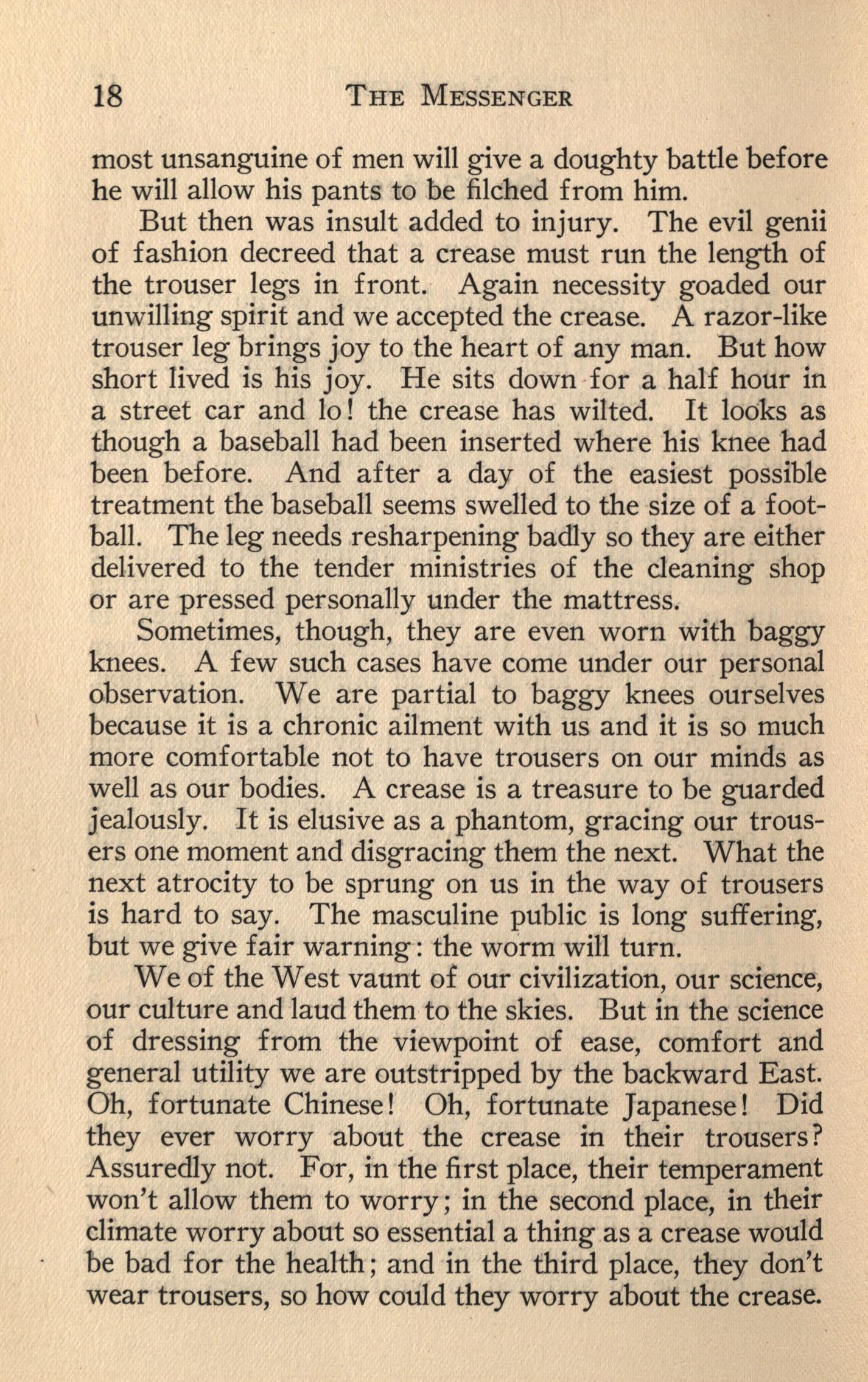
most unsanguine of men will give a doughty battle before he will allow his pants to be filched from him.
But then was insult added to injury. The evil genii of fashion decreed that a crease must run the length of the trouser legs in front. Again necessity goaded our unwilling spirit and we accepted the crease. A razor-like trouser leg brings joy to the heart of any man. But how short lived is his joy. He sits down for a half hour in a street car and lo ! the crease has wilted. It looks as though a baseball had been inserted where his knee had been before . And after a day of the easiest possible treatment the baseball seems swelled to the size of a football. The leg needs resharpening badly so they are either delivered to the tender ministries of the cleaning shop or are pressed personally under the mattress. Sometimes, though, they are even worn with baggy knees. A few such cases have come under our personal observation. We are partial to baggy knees ourselves because it is a chronic ailment with us and it is so much more comfortable not to have trousers on our minds as well as our bodies. A crease is a treasure to be guarded jealously. It is elusive as a phantom, gracing our trousers one moment and disgracing them the next. What the next atrocity to be sprung on us in the way of trousers is hard to say. The masculine public is long suffering, but we give fair warning: the wo'rm will turn.
We of the West vaunt 0£ our civilization, our science, our culture and laud them to the skies. But in the science of dressing from the viewpoint of ease, comfort and general utility we are outstripped by the backward East. Oh, fortunate Chinese! Oh, fortunate Japanese! Did they ever worry about . the crease in their trousers? Assuredly not. For, in the first place, their temperament won't allow them to worry; in the second place, in their climate worry about so essential a thing as a crease would oe bad for the health; and in the third place, they don't wear trousers, so how could they worry about the crease.
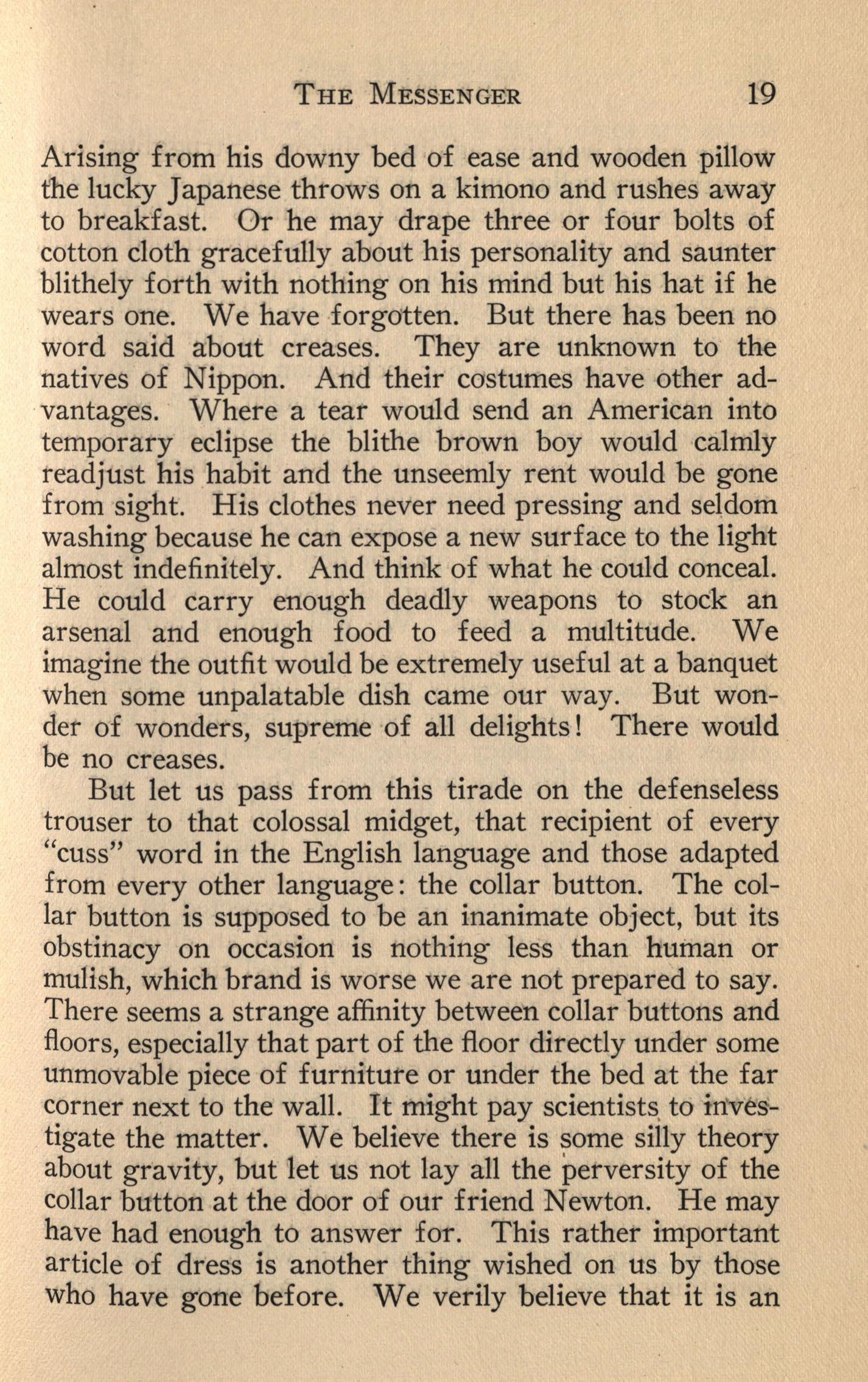
Arising from his downy bed of ease and wooden pi1low t'he lucky Japanese throws on a kimono and rushes away to breakfast. Or he may drape three or four bolts of cotton cloth grace£ ully about his personality and saunter blithely forth with nothing on his mind but his hat if he wears one. We have forgotten. But there has been no word said about creases. They are unknown to the natives of Nippon. And their costumes have other ad.vantages. Where a tear would send an American into temporary eclipse the blithe brown boy would calmly readjust his habit and the unseemly rent would be gone from sight. His clothes never need pressing and se\dom washing because he can expose a new surface to the light almost indefinitely. And think of what he could conceal. He could carry enough deadly weapons to stock an arsenal and enough food to feed a multitude. We imagine the outfit would be extremely useful at a banquet when some unpalatable dish came our way. But wonder of wonders, supreme of all delights ! There would be no creases.
But let us pass from this tirade on the defenseless trouser to that colossal midget, that recipient of every "cuss" word in the English language and those adapted from every other language: the collar button. The collar button is supposed to be an inanimate object, but its obstinacy on occasion is nothing less than human or mulish, which brand is worse we are not prepared to say. There seems a strange affinity between collar buttons and floors, especially that part of the floor directly under some unmovable piece of furniture or under the bed at the far corner next to the wall. It might pay scientists . to investigate the matter. We believe there is some silly theory about gravity, but let us not lay all the perversity of the collar button at the door of our friend Newton. He may have had enough to answer for. This rather important article of dress is another thing wished on us by those who have gone before. We verily believe that it is an
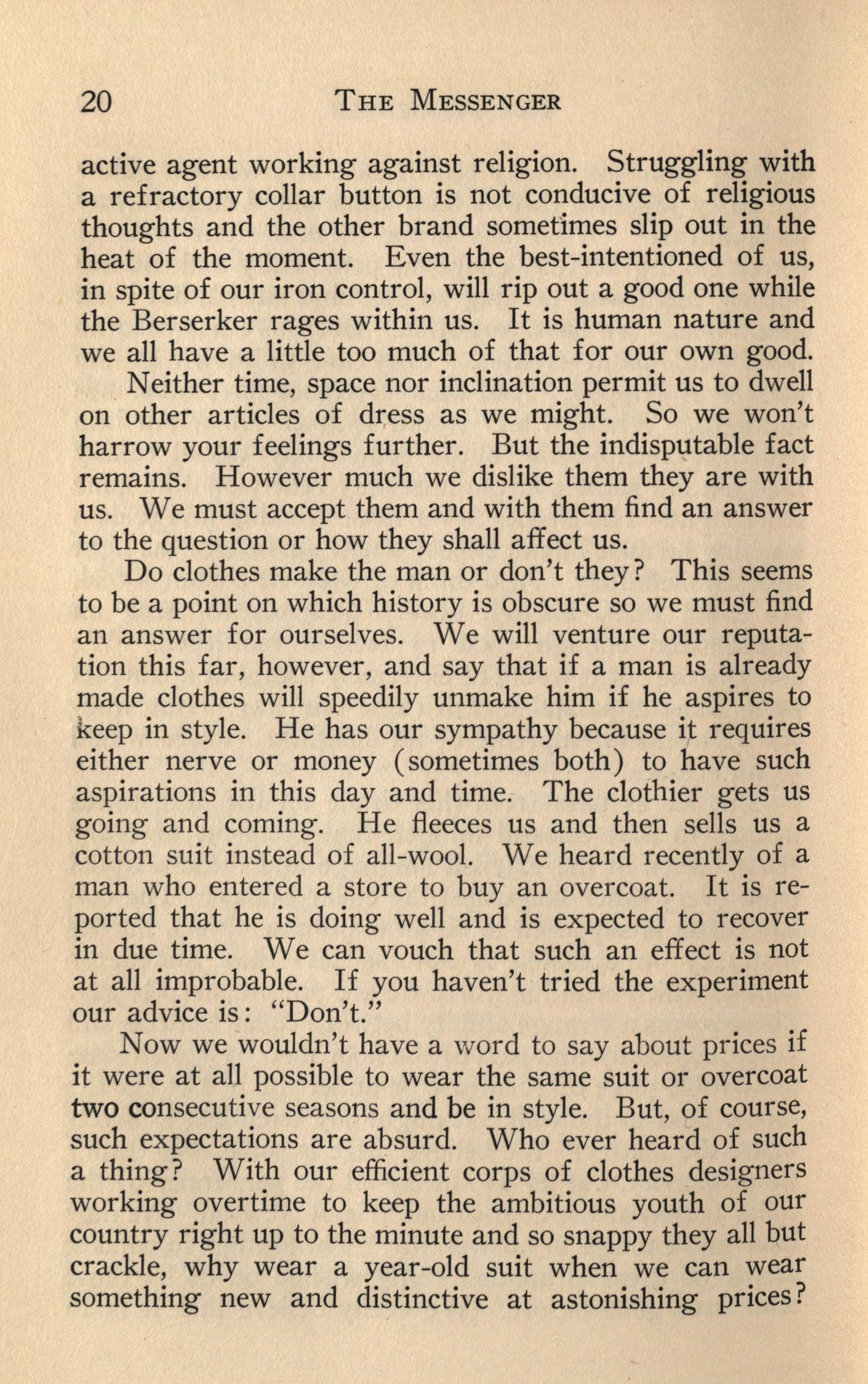
active agent working against religion. Struggling with a refractory collar button is not conducive of religious thoughts and the other brand sometimes slip out in the heat of the moment. Even the best-intentioned of us, in spite of our iron control, will rip out a good one while the Berserker rages within us. It is human nature and we all have a little too much of that for our own good. Neither time, space nor inclination permit us to dwell on other articles of dress as we might. So we won't harrow your feelings further. But the indisputable fact remains. However much we dislike them they are with us. We must accept them and with them find an answer to the question or how they shall affect us. Do clothes make the man or don't they? This seems to be a point on which history is obscure so we must find an answer for ourselves. We will venture our reputation this far, however, and say that if a man is already made clothes will speedily unmake him if he aspires to keep in style. He has our sympathy because it requires either nerve or money ( sometimes both) to have such aspirations in this day and time. The clothier gets us going and coming. He fleeces us and then sells us a cotton suit instead of all-wool. We heard recently of a man who entered a store to buy an overcoat. It is reported that he is doing well and is expected to recover in due time. We can vouch that such an effect is not at all improbable. If you haven't tried the experiment our advice is: "Don't."
Now we wouldn't have a w ord to say about prices if it were at all possible to wear the same suit or overcoat two consecutive seasons and be in style. But, of course, such expectations are absurd. Who ever heard of such a thing? With our efficient corps of clothes designers working overtime to keep the ambitious youth of our country right up to the minute and so snappy they all but crackle, why wear a year-old suit when we can wear something new and distinctive at astonishing prices?
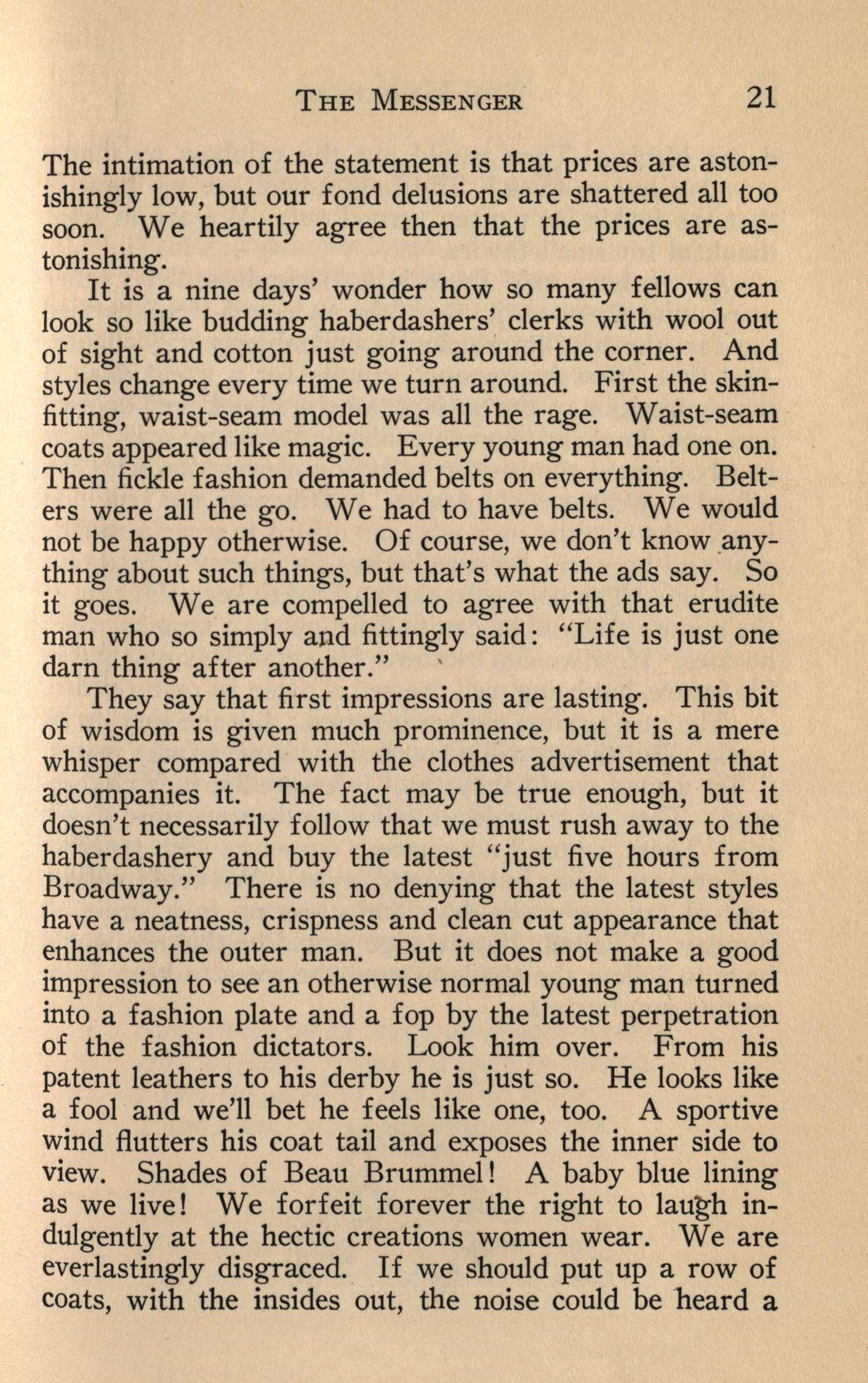
The intimation of the statement is that prices are astonishingly low, but our fond delusions are shattered all too soon. We heartily agree then that the prices are astonishing.
It is a nine days' wonder how so many fellows can look so like budding haberdashers' clerks with wool out of sight and cotton just going around the corner. And styles change every time we turn around. First the skinfitting, waist-seam model was all the rage. Waist-seam coats appeared like magic. Every young man had one on. Then fickle fashion demanded belts on everything. Belters were all the go. We had to have belts. We would not be happy otherwise. Of course, we don't know anything about such things, but that's what the ads say. So it goes. We are compelled to agree with that erudite man who so simply and fittingly said: "Life is just one darn thing after another." '
They say that first impressions are lasting. This bit of wisdom is given much prominence, but it is a mere whisper compared with the clothes advertisement that accompanies it. The fact may be true enough, but it doesn't necessarily follow that we must rush away to the haberdashery and buy the latest "just five hours from Broadway." There is no denying that the latest styles have a neatness, crispness and clean cut appearance that enhances the outer man. But it does not make a good impression to see an otherwise normal young man turned into a fashion plate and a fop by the latest perpetration of the fashion dictators. Look him over. From his patent leathers to his derby he is just so. He looks like a fool and we'll bet he feels like one, too. A sportive wind flutters his coat tail and exposes the inner side to view. Shades of Beau Brummel! A baby blue lining as we live! We forfeit forever the right to laukh indulgently at the hectic creations women wear. We are everlastingly disgraced. If we should put up a row of coats, with the insides out, the noise could be heard a
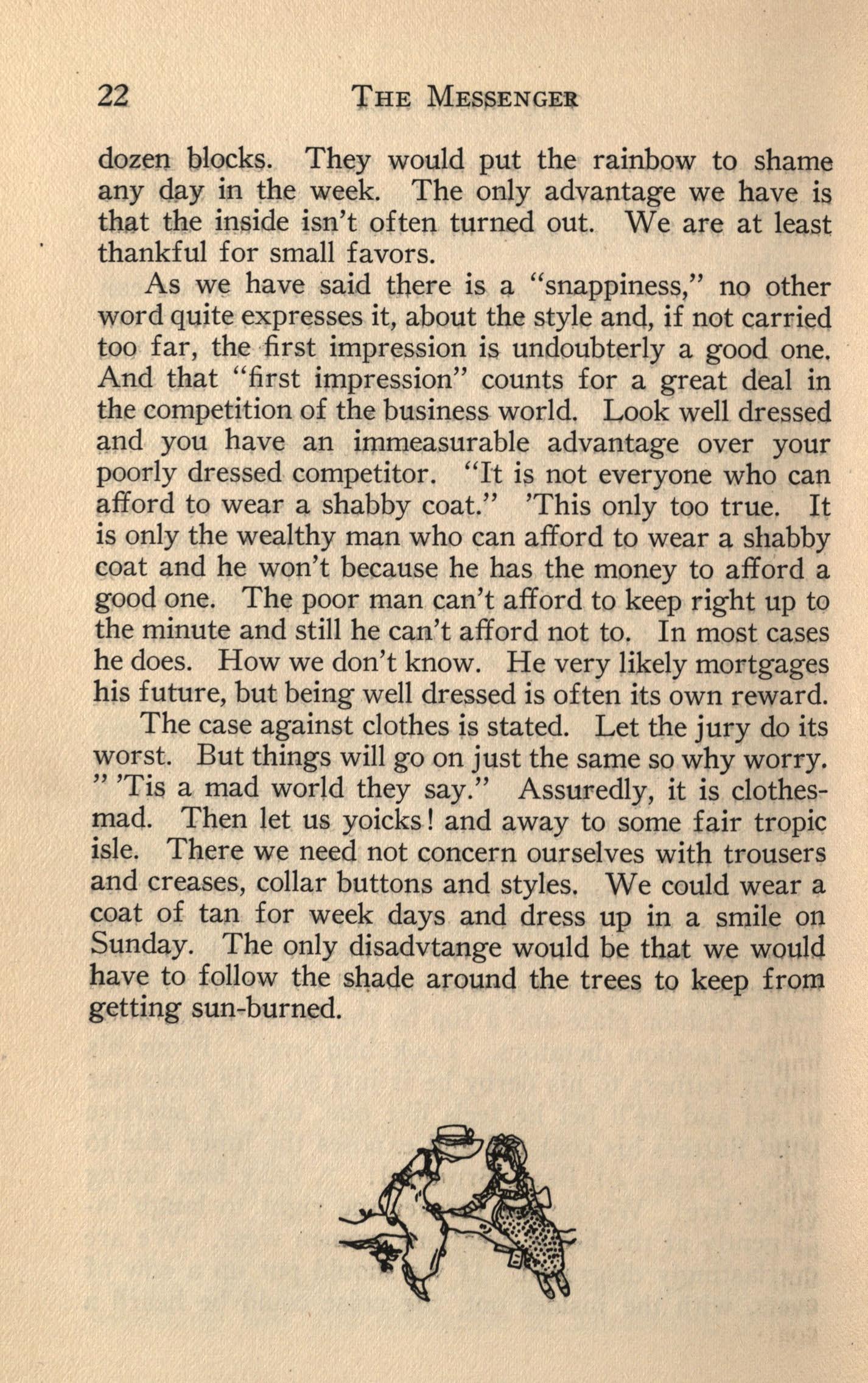
doztn block5. Th~y would put the rainbQw to shame any dfl.Yin the week. The only adyaptage we have is th_at the i11:&ideisl).'t often tµrned out. We are at least thankful for small favors.
As w~ have said t4ere is. a "snappiness/' no other word qujte expr~sses it, about the style ancl, if not carnied toq far, the ·first impression is undoubterly a good one, And that "first iµipression" counts for a great deal in the coµipetition of the business. world. Look well dressed ~nd you have an irpn;i.easurable advantage over your poorly dressed -competitor. "It is not everyone who cau afford to wear a shabby coat." 'This only too true. It is only the wealthy man who can afford to wear cl-shabby coat and he won't because he has the money to afford a good one. Th~ poor man ~an't afford to keep right up to the minute and still he Ccl-til'tafford not to. In most cases he does. How we don't know. He very likely mortgages his future, but being well dressed is of ten its own reward. The case against clothes is stated. Let the jury do its worst. But things will go on just the same so why worry. " 'Tis a mad world they say." Assur<edly, it is clothesmad. Then let us yoicks .! and away to some fair tropic isle. There we need not concern ourselves with trousers and creases, collar buttons and styles. We could wear a coat of tan for week days anq dress up in a smile on Sunday. The only disadvtan.ge woqld be that we would have to follow the sqad,e around the trees to keep from getting sun-burned. ·
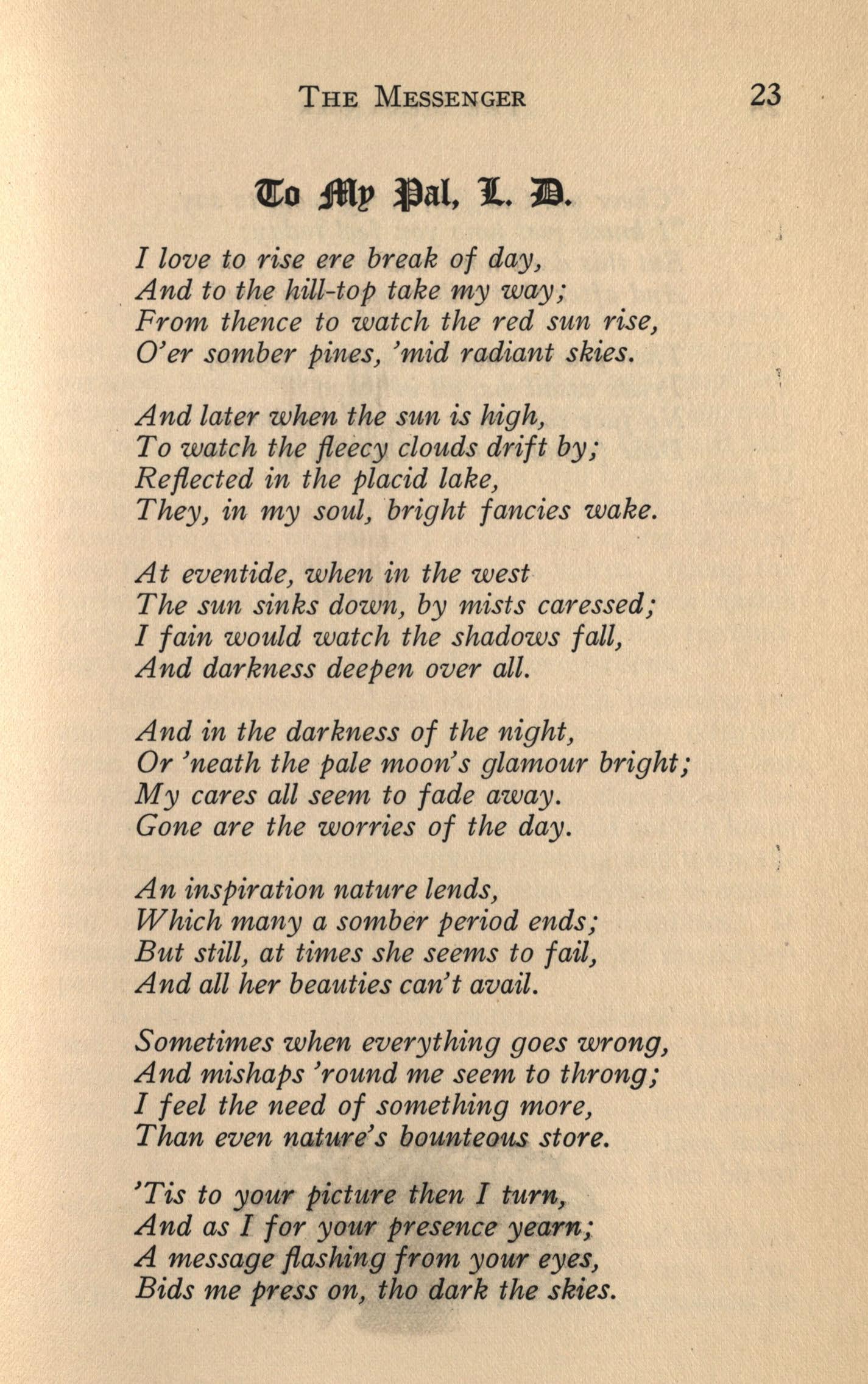
I love to rise ere break of day, . And to th~ hill-top take my way; From thence to watch the red sun rise, O'er somber pines, 'mid radiant skies.
And later when the sun is high, To watch the fleecy clouds drift by; Reflected in the placid lake, They, in my soul, bright fancies wake.
At eventide, when in the west The sun sinks down, by mists caressed; I fain would watch the shadows fall, And darkness deepen over all.
And in the darkness of the night, Or 'neath the pale moon's glamour bright; My cares all seem to fade away. Gone are the worries of the day.
An inspiration nature lends, Which many a somber period ends; But still, at times she seems to fail, And all her beauties can't avail.
Sometimes when everything goes wrong, And mishaps 'round me seem to throng; I feel the need of something more, Than even nature's bounteous. store.
'Tis to your picture then I turn, And as I for your presence yearn,'. A message flashing from your eyes, Bids me press on, tho dark the skies.
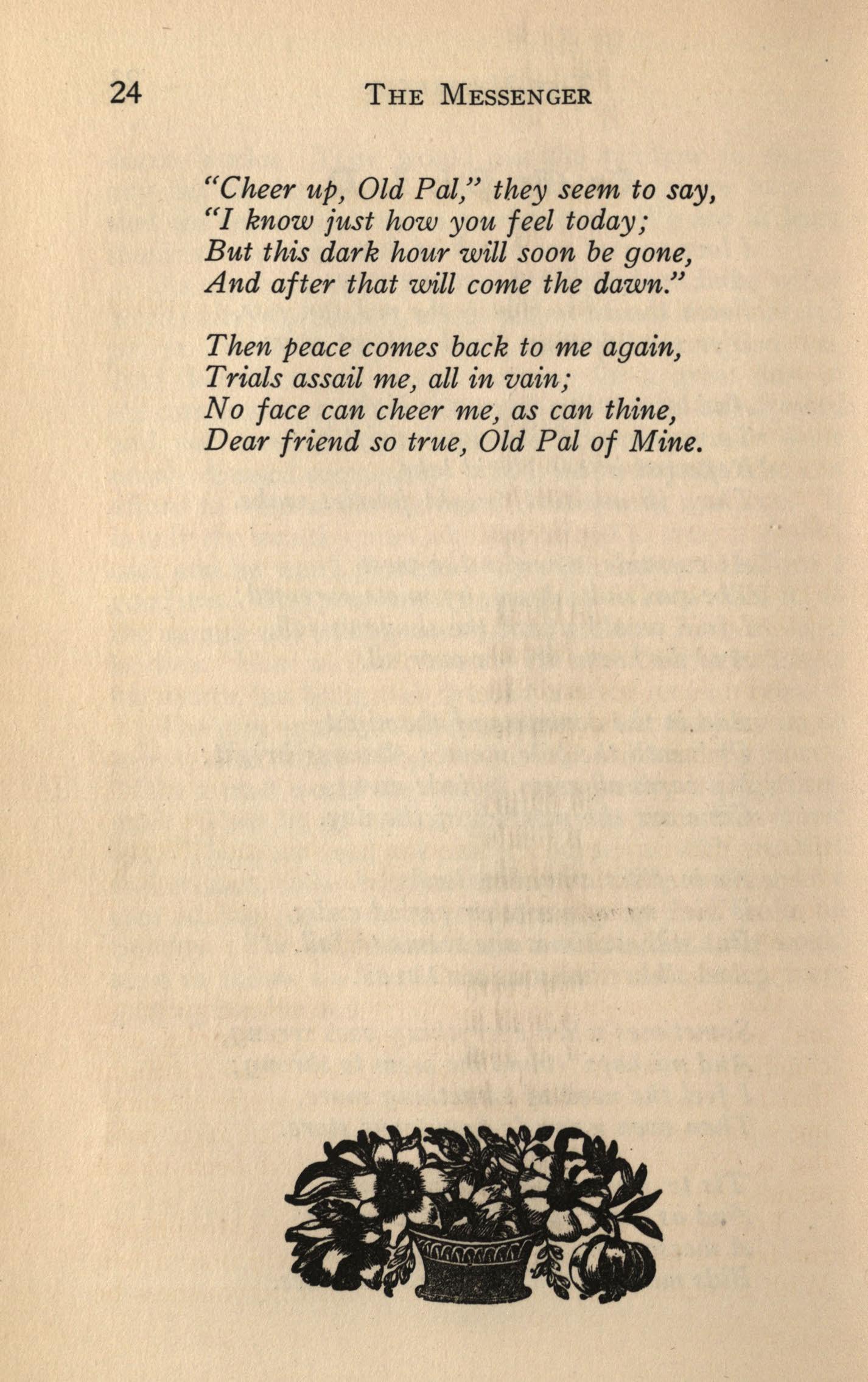
"Cheer up, Old Pal," they seem to say, "I know just how you feel today; But this dark hour will soon be gone, And after that will come the dawn."
Then peace comes back to me again, Trials assail me, all in vain; No face can cheer me, as can thine, Dear friend so true, Old Pal of Mine.
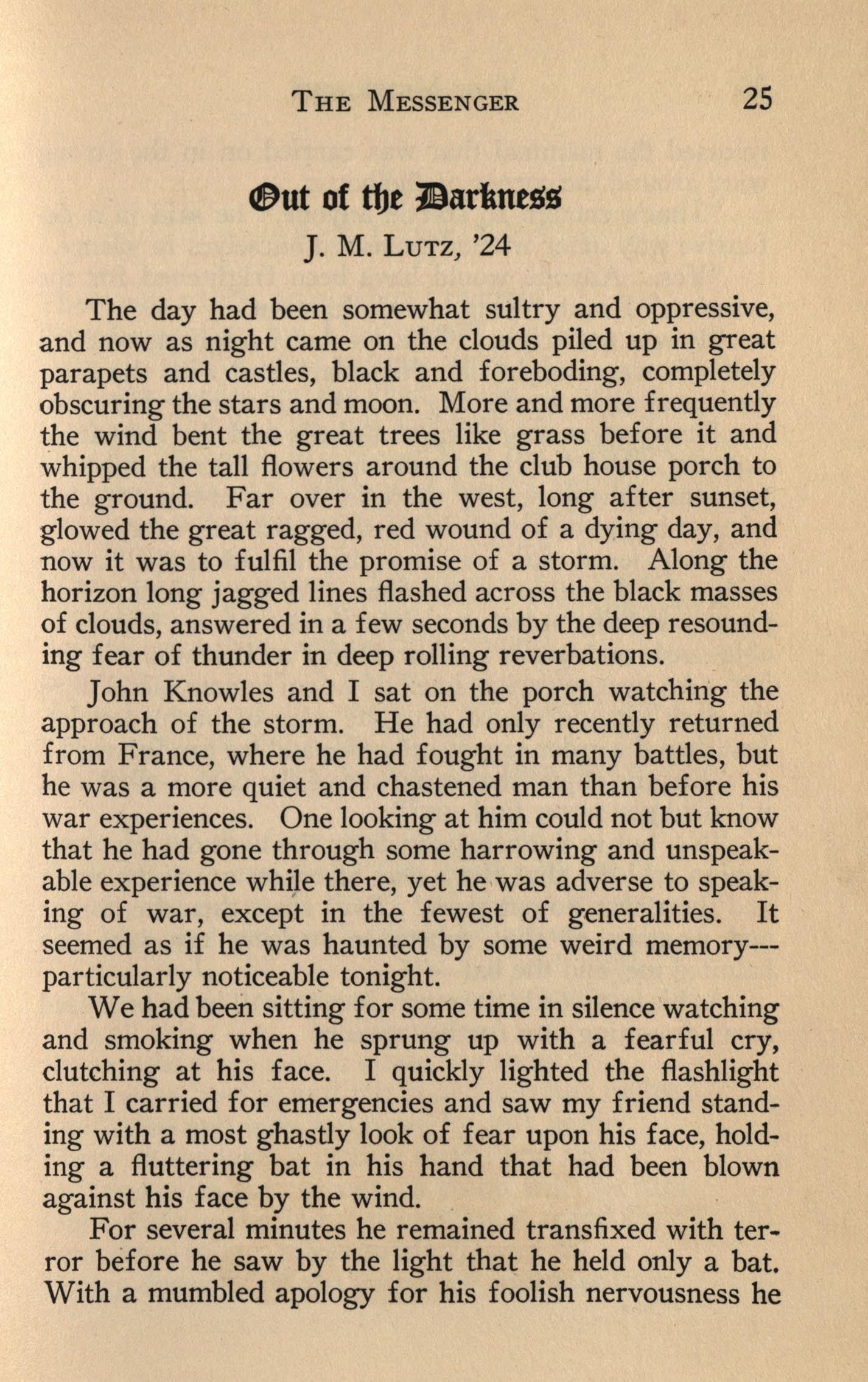
J. M. LUTZ, '24
The day had been somewhat sultry and oppressive, and now as night came on the clouds piled up in great parapets and castles, black and foreboding, completely obscuring the stars and moon. More and more frequently the wind bent the great trees like grass before it and whipped the tall flowers around the club house porch to the ground. Far over in the west, long after sunset, glowed the great ragged, red wound of a dying day, and now it was to fulfil the promise of a storm. Along the horizon long jagged lines flashed across the black masses of clouds, answered in a few seconds by the deep resounding fear of thunder in deep rolling reverbations.
John Knowles and I sat on the porch watching the approach of the storm. He had only recently returned from France, where he had fought in many battles, but he was a more quiet and chastened man than before his war experiences. One looking at him could not but know that he had gone through some harrowing and unspeakable experience while there, yet he was adverse to speaking of war, except in the fewest of generalities. It seemed as if he was haunted by some weird memory--particularly noticeable tonight.
We had been sitting for some time in silence watching and smoking when he sprung up with a fearful cry, clutching at his face. I quickly lighted the flashlight that I carried for emergencies and saw my friend standing with a most ghastly look of fear upon his face, holding a fluttering bat in his hand that had been blown against his face by the wind.
For several minutes he remained transfixed with terror before he saw by the light that he held only a bat. With a mumbled apology for his foolish nervousness he

released the mammal that was carried on in the strong wind around the corner of the house.
"That's enough to startle anyone," he said in a defensive way after we had ne:-seated ourselves in silence.
"Yes. Anyone would have been frightened for the moment," I said, trying to help him out.
' 1 It was not fright. That is---but I might as well tell you. It was a night like this---dark and with the same flashes of light in the sky and the answering roar, but the illumination was from star-shells and the roar from cannons. We had been awaiting the order to advance for some time as we lay there in the front-line _ trenches when a huge shell exploded a short distance away. We all felt grieved, for we knew that it had landed in the midst of a group of companions. As the explosion took place something struck my right cheek. It was indescrib r. able---sof t and warm. and throbbing, as if it was still livti ng. An overpowering smell of warm human blood filled the dark air and mixed with the odor of burnt powder. Just then the order came to ad\fance and we ran forward.,, .
"But the object that eame out 0£ the dark--what was it? Did you never find out?"
"No 1 but in the p,l,leg,rey dawn the next day my e0m,panion told me that there was blood on my right cheek and there was no eut there. Ever since then the horror and mystery of that substanqe striking my face has haunted me, and the bat---" .
At his last words -the storm. burst forth in: its promised fury, dr:owning ~ny further sp,eech.

There was a time, once, when I thought That I was wise; but I had caught Only a vision of what wisdom was: Saw only results and not their cause. It was a child that laid my vainness low; He said, "What is Life?" and lo! I did not know. He asked from the wisdom of his six years, To allay his doubts, to overcome his fears; And in the ignorance of my twenty-one, When asked my answer, I could give him none. What -then? Know Life not? Did I know aught? And so since then each day I've sought Someone who in truth to me could show What Life is. And I've found not many know, For I asked all and when I'd say, "What is Life?" they'd stare, and turn away.
I asked a youth of my own age, and he Took my a,rm and said, "Just come with me." He showed me much that I had always known, The boys and girls with whom I'd grown To manhood. All was joy and fun and youth; Its dances, picnics, games; but was it truth 1? Was all this Life? Is Life forever gay? . Do months and yt,ar:s to music. slip away? Here were Spring and mirth and moonlit nights, The harsh and ugly .mellowed by soft lights. There on the lali:e, a picture bright and fair, Drifting . with the current, as ycmth will; no care Dims their )1~:mnglives.; the strum of mandolin · And clear young- vokes s.oftly joining ipi H~ngS:drowsily on the. perfumed, , still night air,
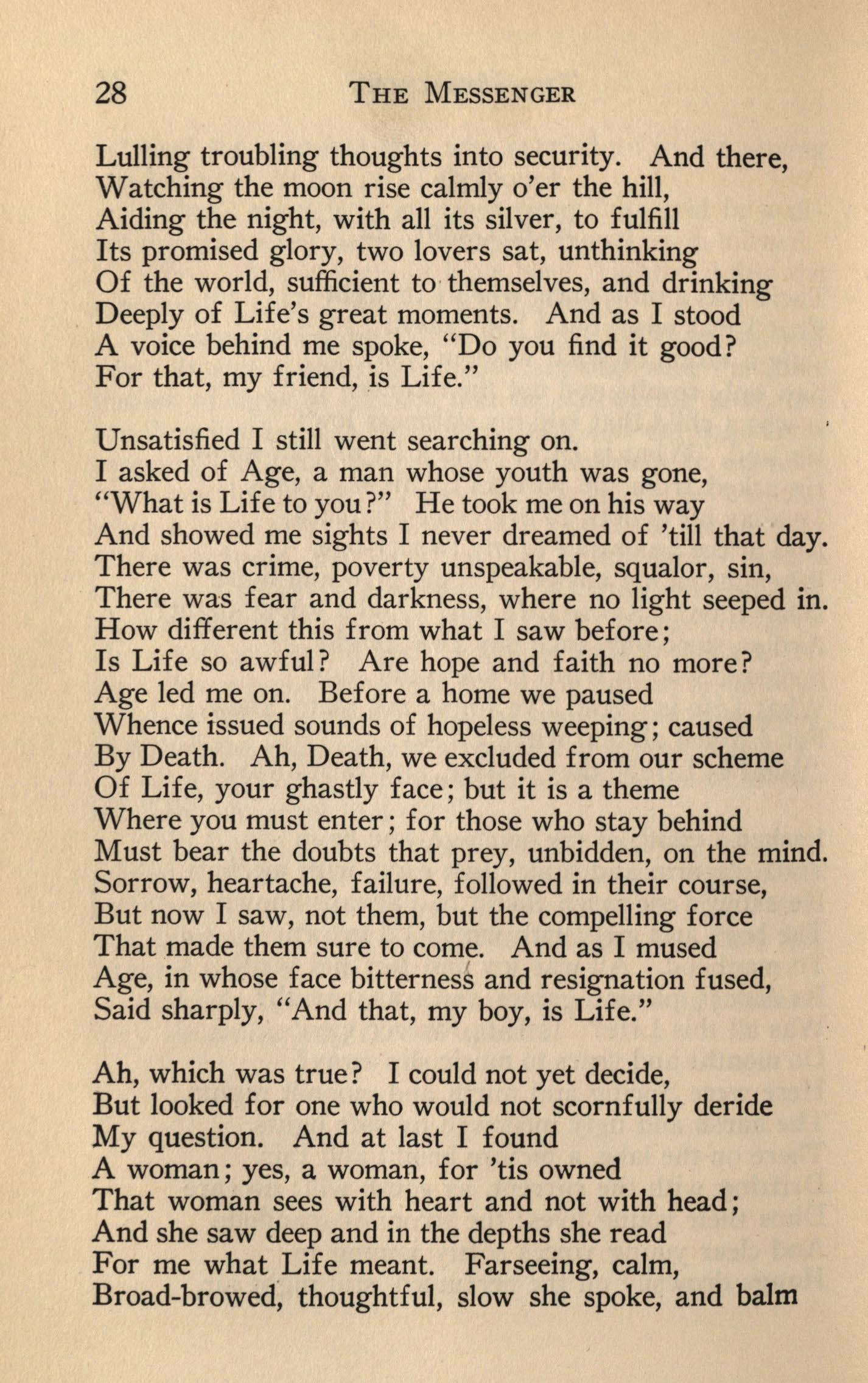
Lulling troubling thoughts into security. And there, Watching the moon rise calmly o'er the hill, Aiding the night, with all its silver, to fulfill Its promised glory, two lovers sat, unthinking Of the world, sufficient to ·themselves, and drinking Deeply of Life's great moments. And as I stood A voice behind me spoke, "Do you find it good? For that, my friend, is Life."
Unsatisfied I still went searching on. I asked of Age, a man whose youth was gone, "What is Life to you?" He took me on his way And showed me sights I never dreamed of 'till that day. There was crime, poverty unspeakable, squalor, sin, There was fear and darkness, where no light seeped in. How different this from what I saw before; Is Life so awful? Are hope and faith no more? Age led me on. Before a home we paused Whence issued sounds of hopeless weeping; caused By Death. Ah, Death, we excluded from our scheme Of Life, your ghastly face; but it is a theme Where you must enter; for those who stay behind Must bear the doubts that prey, unbidden, on the mind. Sorrow, heartache, failure, followed in their course, But now I saw, not them, but the compelling force That made them sure to come. And as I mused Age, in whose face bitternes§ and resignation fused, Said sharply, "And that, my boy, is Life."
Ah, which was true? I could not yet decide, But looked for one who would not scorn£ully deride My question. And at last I found A woman; yes, a woman, for 'tis owned That woman sees with heart and not with head; And she saw deep and in the depths she read For me what Life meant. Farseeing, calm, Broad-browed~ thoughtful, slow she spoke, and balm
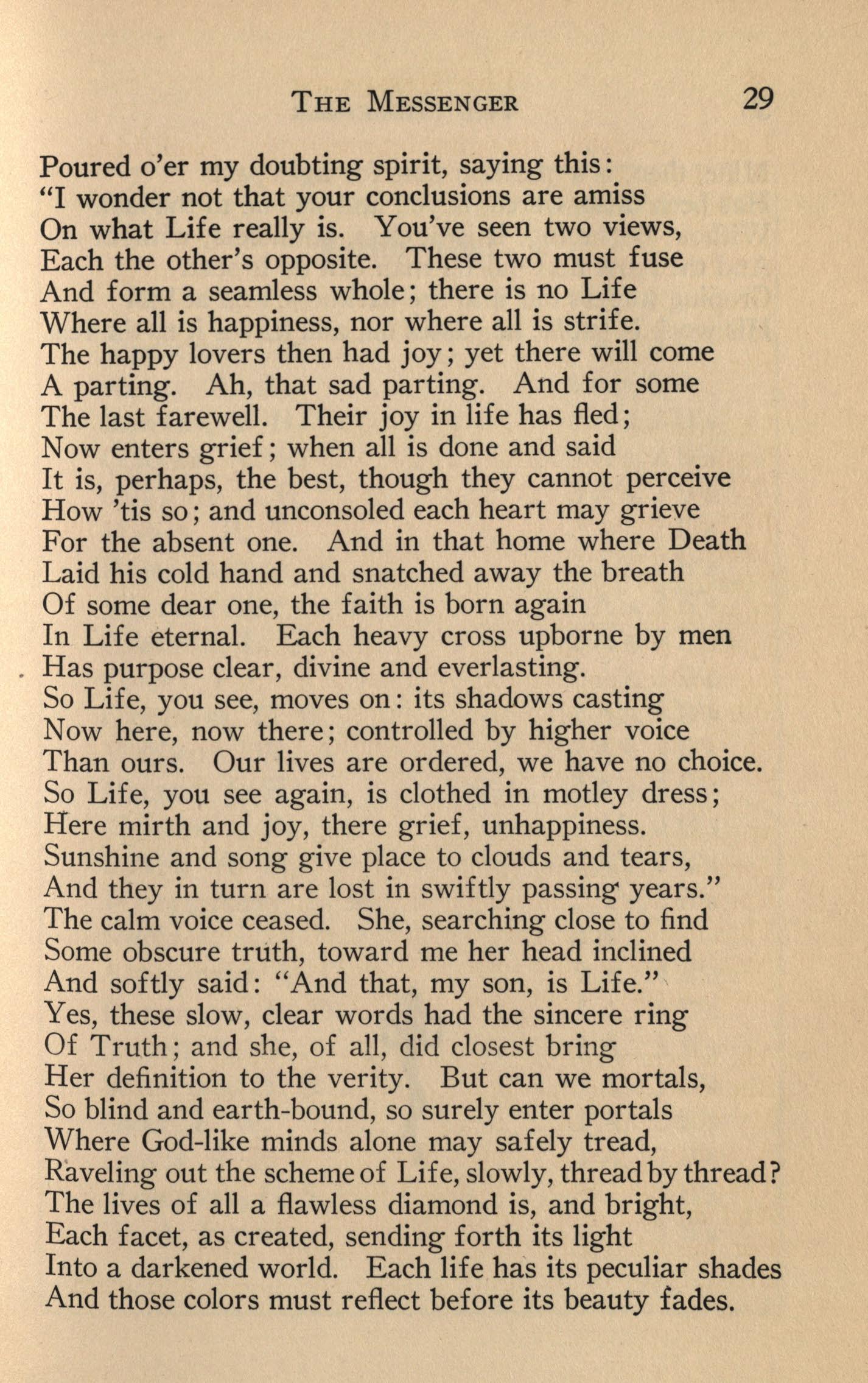
Poured o'er my doubting spirit, saying this: "I wonder not that your conclusions are amiss On what Life really is. You've seen two views, Each the other's opposite. These two must fuse And form a seamless whole; there is no Life Where all is happiness, nor where all is strife. The happy lovers then had joy; yet there will come A parting. Ah, that sad parting. And for some The last farewell. Their joy in life has fled; Now enters grief; when all is done and said
It is, perhaps, the best, though they cannot perceive How 'tis so; and unconsoled each heart may grieve For the absent one. And in that home where Death Laid his cold hand and snatched away the breath Of some dear one, the faith is born again In Life eternal. Each heavy cross upborne by men Has purpose clear, divine and everlasting. So Life, you see, moves on: its shadows casting Now here, now there; controlled by higher voice Than ours. Our lives are ordered, we have no choice. So Li£ e, you see again, is clothed in motley dress; Here mirth and joy, there grief, unhappiness. Sunshine and song give place to clouds and tears, And they in turn are lost in swiftly passing years." The calm voice ceased. She, searching close to find Some obscure truth, toward me her head inclined And softly said: "And that, my son, is Life." Yes, these slow, clear words had the sincere ring Of Truth; and she , of all, did closest bring Her definition to the verity. But can we mortals, So blind and earth-bound, so surely enter portals Where God-like minds alone may safely tread, Raveling out the scheme of Life, slowly, thread by thread? The lives of all a flawless diamond is, and bright, Each facet, as created, sending forth its light Into a darkened world. Each life has its peculiar shades And those colors must reflect before its beauty fades.

Mine, then, is a question that for ages past Has been unanswered, is yet, and will be to the last. Without beginning, it is ageless, boundless, without end And the tnost that mortal man can do is send Groping fingers out into the darkness, and at best His work is futile; he passes on, and lea:ves it to the rest.
STOCKTON, BEE
ALLEY, R. E ..
BOWLES, S. H.
CLARKE, A. B.
GUTHRIE, J. B.
MARSH, R. T.
p ASSAMANECK, E.
WHITEHURST, S. W.
CARLTON, L. C. .
COHEN, P. . . .
GARRISON, C. w.
McNEILL, W. A.
-MILLER, J. H.
MITCHELL, B. E.
SMITH, A. M.
WHITEHURST, L. M.
JONES, L. L. . .
ADDINGTON, L. C.
DRINKARD, R. D.
SMITH, A.G ..
WHITTED, H. S.
GRAY, E. w ..
LEWIS, R. E ..
MITCHELL, G. s.
w. A. EVANS ..

4A's, 2 B's
4A's, 1 B
3 A's, 2 B's
3 A's, 2 B's
3 A's, 2 B's
3 A's, 2 B's
3 A's, 2 B's
3 A's, 2 B's
2 A's 3 B's ' 2 A's, 3 B's 2 A's, 3 B's
2 A's, 3 B's
2 A's, 3 B's
2 A's, 3 B's
2 A's, 2 B's
2 A's, 2 B's
2A's, 1 A, 4 B's
1 A, 4 B's
1 A, 5 B's
1 A, 5 B's
1 A, 3 B's
1 A, 3 B's '5 B's ·S B's
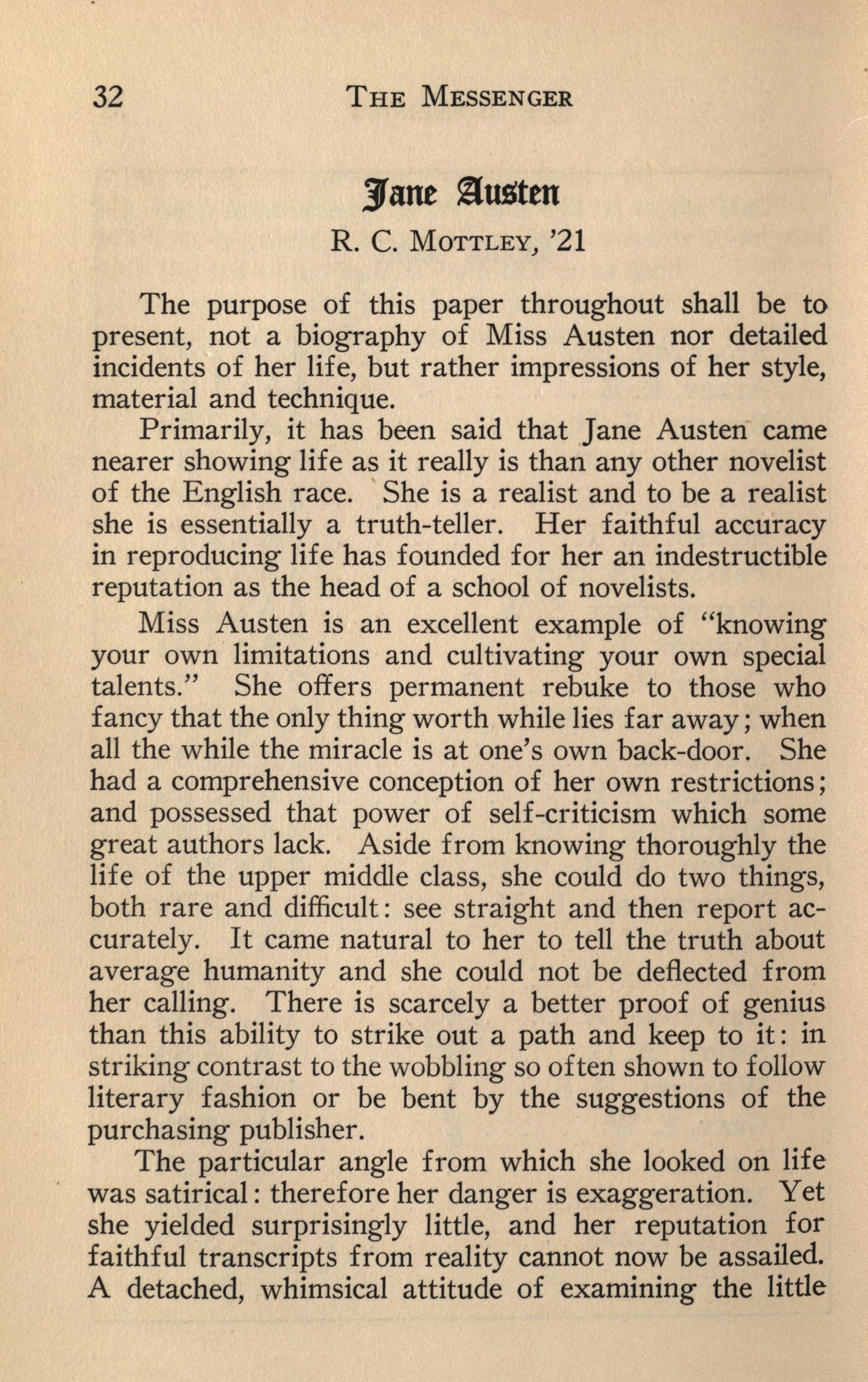
The purpose of this paper throughout shall be to present, not a biography of Miss Austen nor detailed incidents of her life, but rather impressions of her style, material and technique.
Primarily, it has been said that Jane Austen came nearer showing life as it really is than any other novelist of the English race. ' She is a realist and to be a realist she is essentially a truth-teller. Her faithful accuracy in reproducing life has founded for her an indestructible reputation as the head of a school of novelists.
Miss Austen is an excellent example of "knowing your own limitations and cultivating your own special talents." She offers permanent rebuke to those who fancy that the only thing worth while lies far away; when all the while the miracle is at one's own back-door. She had a comprehensive conception of her own restrictions; and possessed that power of self-criticism which some great authors lack. Aside from knowing thoroughly the life of the upper middle class, she could do two things, both rare and difficult: see straight and then report accurately. It came natural to her to tell the truth about average humanity and she could not be deflected from her calling. There is scarcely a better proof of genius than this ability to strike out a path and keep to it: in striking contrast to the wobbling so of ten shown to follow literary fashion or be bent by the suggestions of the purchasing publisher.
The particular angle from which she looked on life was satirical: therefore her danger is exaggeration. Yet she yielded surprisingly little, and her reputation for faithful transcripts from reality cannot now be assailed. A detached, whimsical attitude of examining the little
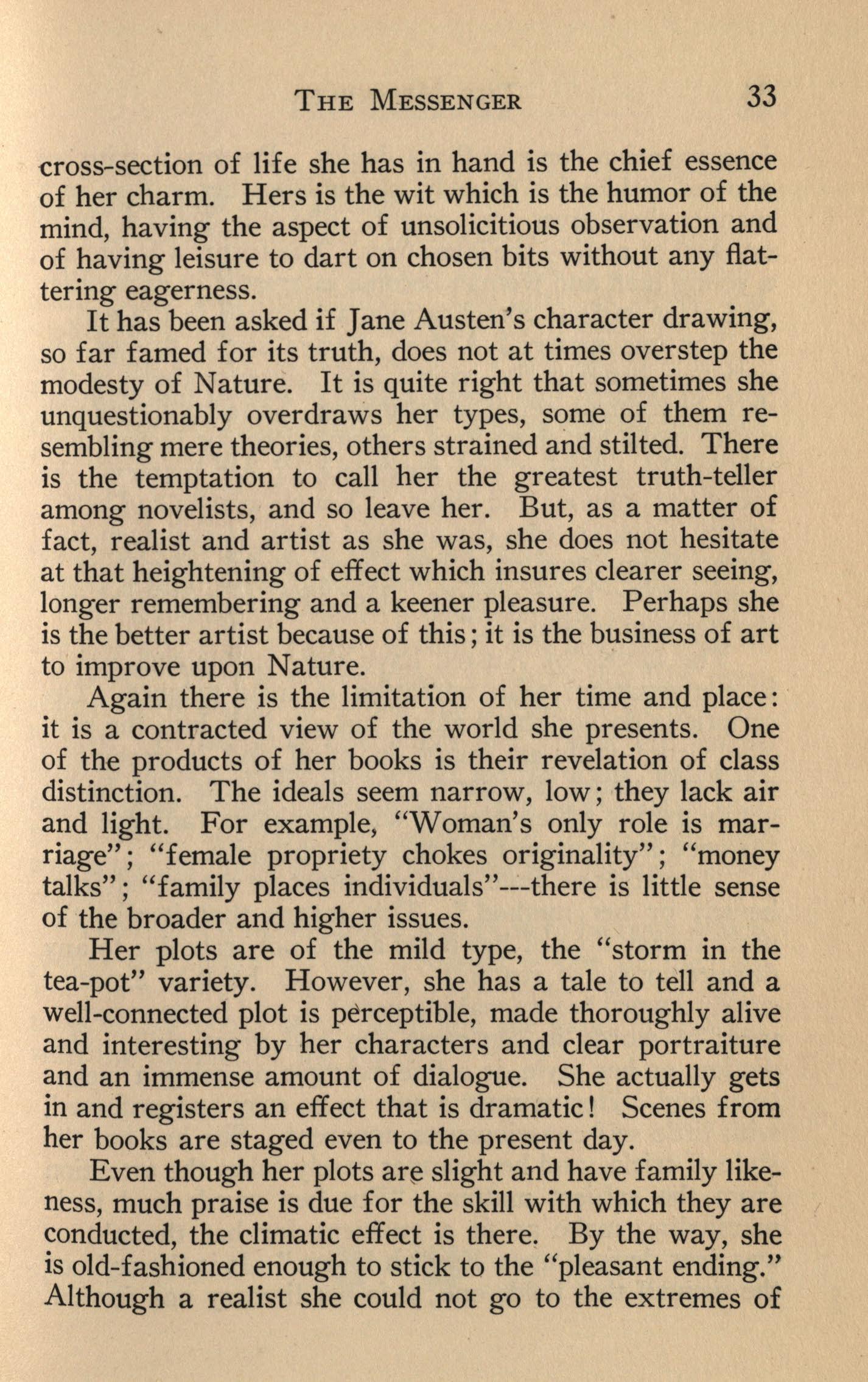
-cross-section of life she has in hand is the chief essence of her charm. Hers is the wit which is the humor of the mind, having the aspect of unsolicitious observation and of having leisure to dart on chosen bits without any flattering eagerness.
It has been asked if Jane Austen's character drawing, so far famed for its truth, does not at times overstep the modesty of Nature. It is quite right that sometimes she unquestionably overdraws her types, some of them resembling mere theories, others strained and stilted. There is the temptation to call her the greatest truth-teller among novelists, and so leave her. But, as a matter of fact, realist and artist as she was, she does not hesitate at that heightening of effect which insures clearer seeing, longer remembering and a keener pleasure. Perhaps she is the better artist because of this; it is the business of art to improve upon Nature. ·
Again there is the limitation of her time and place: it is a contracted view of the world she presents. One of the products of her books is their revelation of class distinction. The ideals seem narrow, low; they lack air and light. For example, "Woman's only role is marriage"; "female propriety chokes originality"; "money talks"; "family places individuals"---there is little sense of the broader and higher issues.
Her plots are of the mild type, the "storm in the tea-pot" variety. However, she has a tale to tell and a well-connected plot is perceptible, made thoroughly alive and interesting by her characters and clear portraiture and an immense amount of dialogue. She actually gets in and registers an effect that is dramatic! Scenes from her books are staged even to the present day.
Even though her plots art slight and have family likeness, much praise is due for the skill with which they are conducted, the climatic effect is there. By the way, she is old-fashioned enough to stick to the "pleasant ending." Although a realist she could not go to the extremes of

interpretation some authors depict. Possessed with an avowed dislike for tragedy, she finishes her stories in a manner that leaves one content. She only cared to write one sort of novel---the love story. The formula is simple: a young man and woman become interested in each other and after various complications are united in the end. For her material Austen always sticks to her experience \ beneath the whims and nonsense there is the drift of common-sense and thinking . She is artist enough not to make her characters .a mouthpiece for herself and yet in the selection and treatment of her material she spoke her opinions and ideals. "Young women had better marry husbands who can support them. Gentlemen suffering from ennui may find a very useful occupation in looking after their tenants. Her ideal of manhood was the heroism of the sea."
The novels of Austen have their movement mainly in conversation, with narration in little patches. Descriptions do not stand alone, but are knit into the plot. She wrote with an image in mind and it grew and developed under her hand. In other words, she had a gentle genius which glowed with luminous radiance and fastened itself upon the hearts of posterity.
"The style of Jane Austen cannot be separated from herself or her method." This means that it was the natural easy flow of her mind and is not traceable to any definite course of reading. It was her habit to examine closely a word before making use of it, and in the arrangement of words in sentences she had great skill. Her diction, or her style, is a fine example of using a means to an end. Her manner seems to be easy and unforced, with little self-consciousness apparent. She has not the style of tricks, and her manner rarely takes the attention from the subject matter. "But her words and their · marshaling make as fit a garment for her thought as was ever devised upon English looms." It is the style of the woman that holds one; it is not literary nor formal,
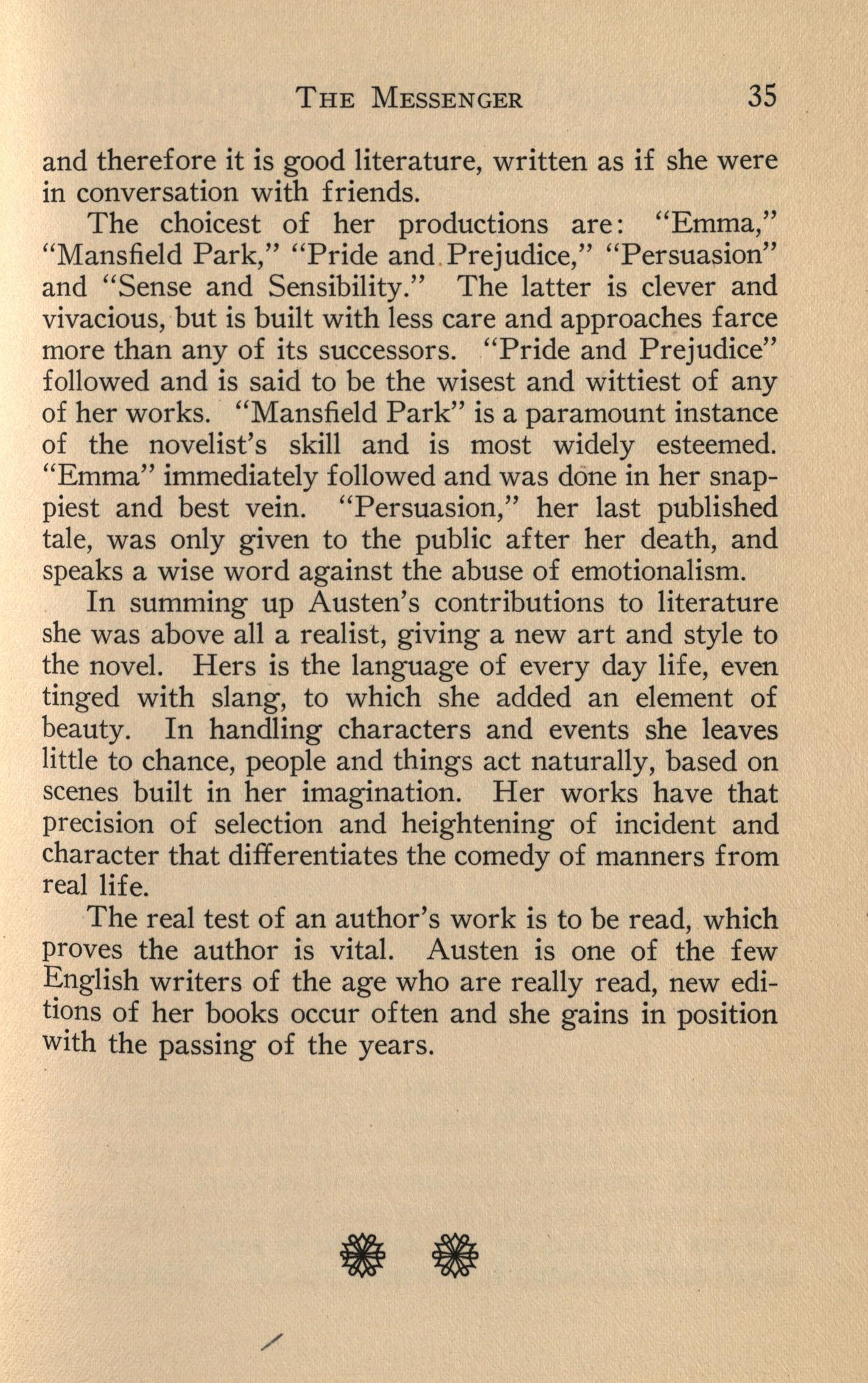
and therefore it is good literature, written as if she were in conversation with friends.
The choicest of her productions are: "Emma," "Mansfield Park," "Pride and Prejudice," "Persuasion" and "Sense and Sensibility." The latter is clever and vivacious, but is built with less care and approaches farce more than any of its successors. "Pride and Prejudice" followed and is said to be the wisest and wittiest of any of her works. "Mansfield Park" is a paramount instance of the novelist's skill and is most widely esteemed. " Emma" immediately followed and was done in her snappiest and best vein. "Persuasion," her last published tale, was only given to the public after her death, and speaks a wise word against the abuse of emotionalism.
In summing up Austen's contributions to literature she was above all a realist, giving a new art and style to the novel. Hers is the language of every day life, even tinged with slang, to which she added an element of beauty. In handling characters and events she leaves little to chance, people and things act naturally, based on scenes built in her imagination. Her works have that precision of selection and heightening of incident and character that differentiates the comedy of manners from real life.
The real test of an author's work is to be read, which proves the author is vital. Austen is one of the few English writers of the age who are really read, new editions of her books occur of ten and she gains in position with the passing of the years .


KATHARINE H. SPICER ______________________________________ Editor
VIRGINIA NEWBILL_ _______________________________Assistant Editor
PEGGY BUTTERFIELD _____________________________Exchange Editor
MARY FUGATE ___________________________________Business Manager
LELIA DOAN _____________________________Assistant Business Manager
A new year, a new term and numerous other new things to start out with anew. What will it bring to us, this newborn year? All sorts and kinds of experiences, no doubt, varying from girl to girl. To some New life will be very much the same and continue on Days the same level, rather monotonous level, placid · and calm; for others there will be great events, upheavals, overturning all their former life; these events may be catastrophies, sorrows, tragedies, or they may be joys such as rarely come but once in a lifetime, if that of ten. We think sometimes that we would give almost anything to be able to look ahead accurately and to see just exactly what is coming to us in the next twelve months. And yet who would be altogether willing to take the risk, who but an incurable optimist would gamble on the chance that the good news would overshadow the bad. After all, where would the fun be if there were no surprises? And so, while we hope for the best and expect the worst, let us live each day as it comes and live it to the full, only leaving enough energy to go on with the next day. "Sufficient unto the day is the evil thereof."
We have been Seniors, twenty-seven of us, for three whole months now. Perhaps you others wonder how we feel since we reached that pinnacle which seems so far away in Freshman and Sophomore days and Seniority even, to some extent, in one's Junior year. Some of us think that we could only answer, "Uncertain." We are uncertain of ourselves these days;
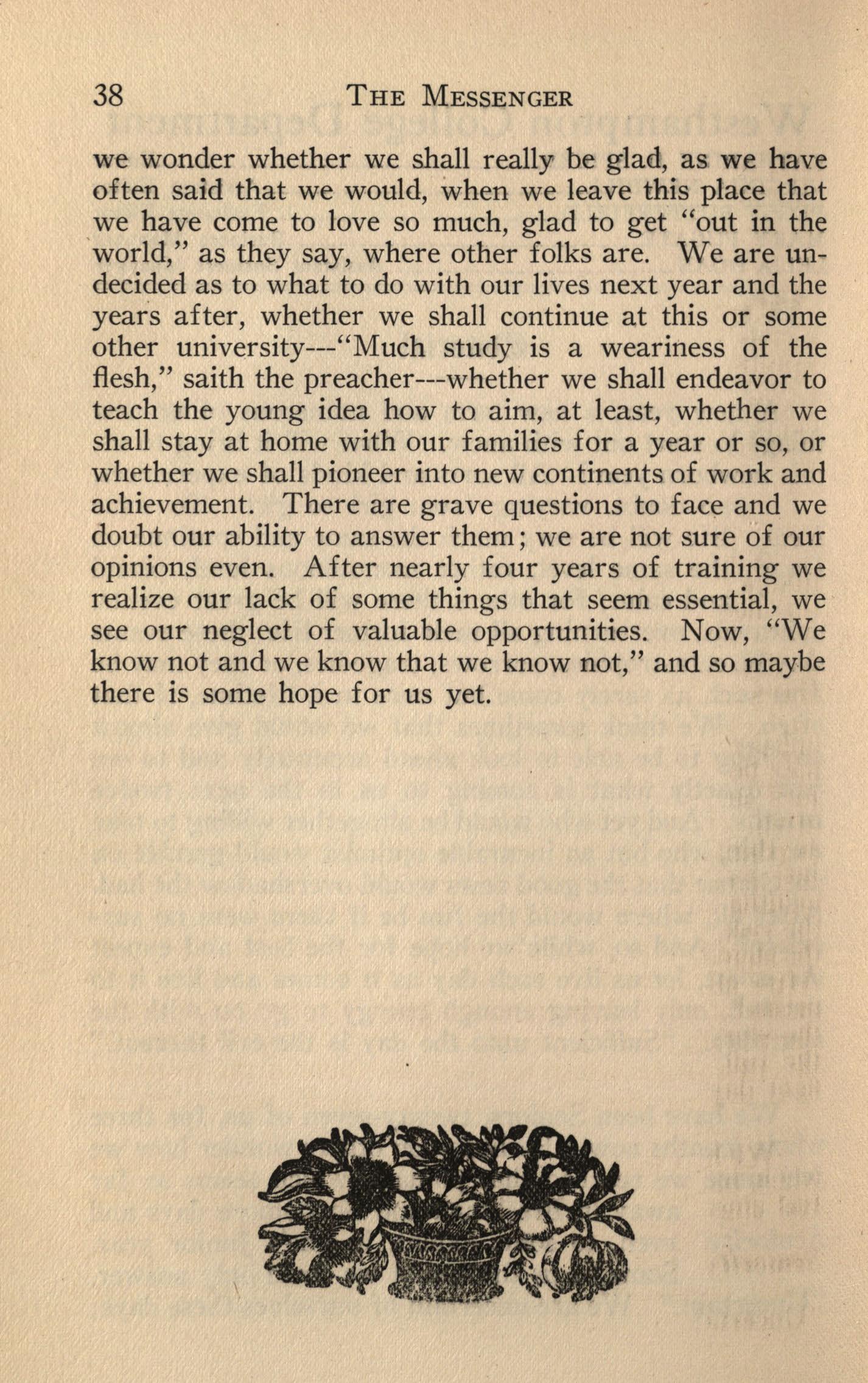
we wonder whether we shall really be glad, as , we have often said that we would, when we leave this place that we have come to love so much, glad to get "out in the ' world," as they say, where other folks are. We are undecided as to what to do with our lives next year and the years after, whether we shall continue a.t this or some other university---"Much study is a weariness of the flesh," saith the preacher---whether we shall endeavor to teach the young idea how to. aim, at least, whether we shall stay at home with our families for a year or so, or whether we shall pioneer into new continents of work and achievement. There are grave questions to face and we doubt our ability to answer them; we are not sure ofour opinions even. After nearly four years of training we realize our lack of some things that seem essential, we see our neglect of valuable opportunities. Now, "We know not and we know that we know not," and so maybe there is some hope for us yet.
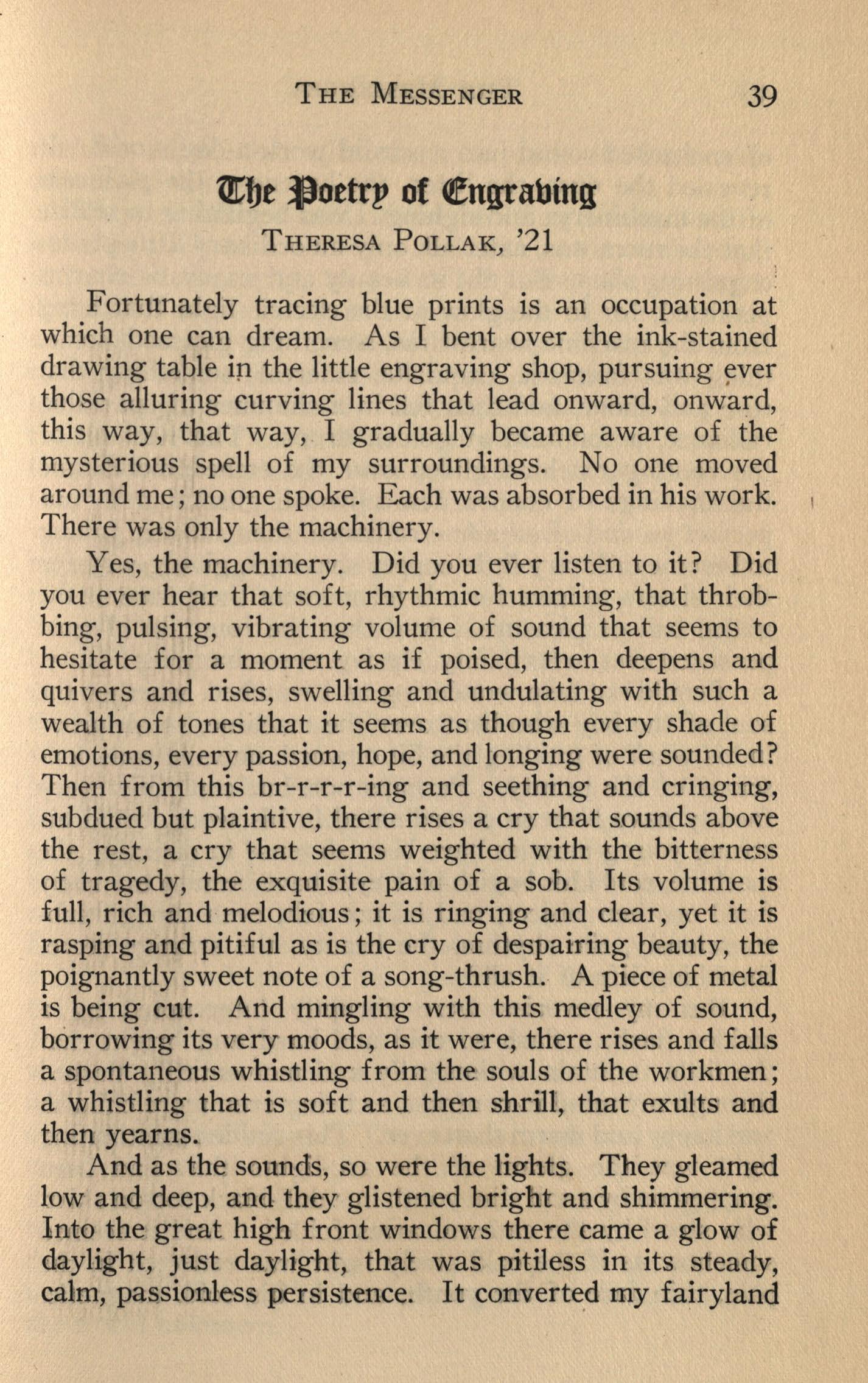
THERESA POLLAK , '21
Fortunately tracing blue prints is an occupation at which one can dream . As I bent over the ink-stained drawing table ip the little engraving shop, pursuin g ~ver those alluring curving lines that lead onward, onward, this way, that way , I gradually became aware of the mysterious spell of my surroundings. No one moved around me; no one spoke. Each was absorbed in his work. 1 There was only the machinery.
Yes, the machinery. Did you ever listen to it? Did you ever hear that soft, rhythmic humming, that throbbing, pulsing, vibrating volume of sound that seems to hesitate for a moment as if poised , then deepens and quivers and rises, swelling and undulating with such a wealth of tones that it seems as though every shade of emotions, every passion, hope, and longing were sounded? Then from this br-r-r-r-ing and seething and cringing, subdued but plaintive, there rises a cry that sounds above the rest, a cry that seems weighted with the bitterness of tragedy, the exquisite pain of a sob. Its volume is full, rich and melodious; it is ringing and clear, yet it is rasping and pitiful as is the cry of despairing beauty, the poignantly sweet note of a song-thrush. A piece of metal is being cut. And mingling with this medley of sound, borrowing its very moods, as it were, there rises and falls a spontaneous whistling from the souls of the workmen; a whistling that is soft and then shrill, that exults and then yearns.
And as the sounds, so were the lights. They gleamed low and deep, and they glistened bright and shimmering. Into the great high front windows there came a glow of daylight, just daylight, that was pitiless in its steady, calm, passionless persistence. It converted my fairyland
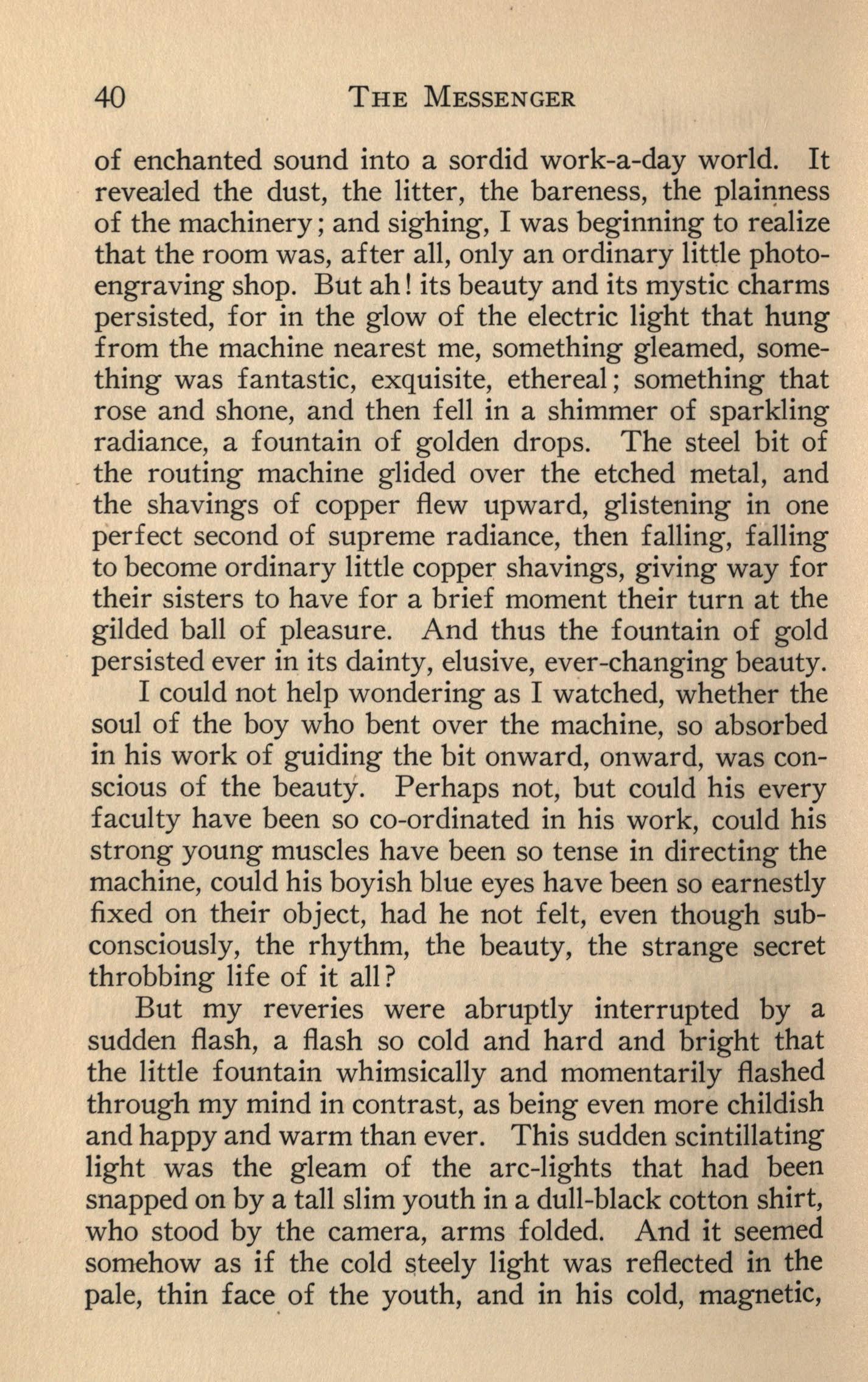
of enchanted sound into a sordid work-a-day world. It revealed the dust, the litter, the bareness, the plai~ness of the machinery; and sighing, I was beginning to realize that the room was, after all, only an ordinary little photoengraving shop. But ah! its beauty and its mystic charms persisted, for in the glow of the electric light that hung from the machine nearest me, something gleamed, something was fantastic, exquisite, ethereal; something that rose and shone, and then fell in a shimmer of sparkling radiance, a fountain of golden drops. The steel bit of _ the routing machine glided over the etched metal, and the shavings of copper flew upward, glistening in one perfect second of supreme radiance, then falling, falling to become ordinary little copper shavings, giving way for their sisters to have for a brief moment their turn at the gilded ball of pleasure. And thus the fountain of gold persisted ever in its dainty, elusive, ever-changing beauty. I could not help wondering as I watched, whether the soul of the boy who bent over the machine, so absorbed in his work of guiding the bit onward, onward, was conscious of the beauty. Perhaps not, but could his every faculty have been so co-ordinated in his work, could his strong young muscles have been so tense in directing the machine, could his boyish blue eyes have been so earnestly fixed on their object, had he not felt, even though subconsciously, the rhythm, the beauty, the strange secret throbbing life of it all?
But my reveries were abruptly interrupted by a sudden flash, a flash so cold and hard and bright that the little fountain whimsically and momentarily flashed through my mind in contrast, as being even more childish and happy and warm than ever. This sudden scintillating light was the gleam of the arc-lights that had been snapped on by a tall slim youth in a dull-black cotton shirt, who stood by the camera, arms folded. And it seemed somehow as if the cold ~teely light was reflected in the pale, thin face _of the youth, and in his cold, magnetic,

s teel-blue eyes, that glinted above dark shadows and ,colorless cheeks.
Then, as after a cold, biting bit of cynicism, we are left in an abyss of darkness, a darkness that is comforting in its very obscurity, so I was left when the arc-light flashed off as suddenly as it had appeared, and the lad with the weird, cold eyes had been swallowed up in the -obscurity of the "dark room." For a moment I was conscious only of the shadow lurking around the door, as t hough it would enter also, a purplish, velvety mist of murky blackness; but gradually I became aware of a soft rosy flush, a flush that diffused the shadow with a quaint w arm glow of gentle optimism. Following this glow to i ts source through the open door of the partition next to the " dark room, " I discovered a strangely mystic and beautiful place. The warm, rich blue flames of a gas burner caused weird, green-blue lights to dance and q uiver on the walls and mysterious impenetrable shadows to crouch in the corners. Over the flame a piece of copper was being burnished to a red hot glow, and it flashed and blazed with a wild, rich brilliance. And in the midst of it all there stood, heating the metal, an old man, the red glow lighting up his wrinkled, rugged features and catching in the abundance of his brown-grey curly hair, then reflecting itself in the twinkling, small brown eyes. The light played also on the sturdy shoulders that were con.stantly thrown backward in a gesture of freedom and on t he great strong hands that seemed so remarkably skilful. And a feeling of awe and wonder came over me as I watched. What mysterious power was this that the machinery held, to react so strongly upon and fill the souls ·of these human beings? They were rough and uncouth, unmindful of those higher things of the spirit. The machinery was hard and cold, inanimate; and yet together they seemed to form a whole that was vibrant with the -deepest and finest feelings of life; that passionate tumultuous joy of living, that underlying strain of sadness of the world unknown.
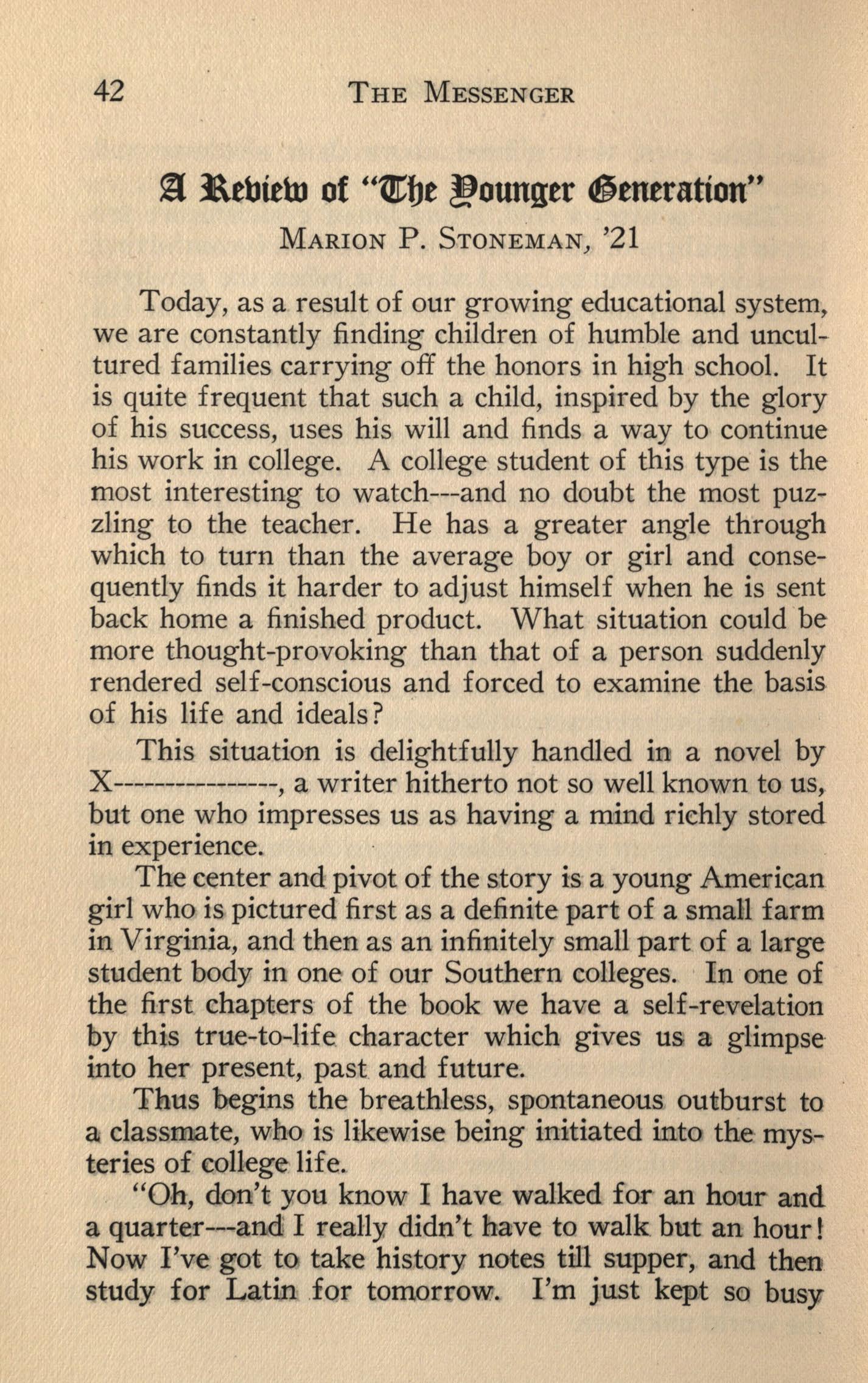
MARION P. STONEMAN, '21
Today, as a result of our growing educational system, we are constantly finding children of humble and uncultured families carrying off the honors in high school. It is quite frequent that such a child, inspired by the glory of his success, uses his will and finds a way to continue his work in college. A college student of this type is the most interesting to watch---and no doubt the most puzzling to the teacher. He has a greater angle through which to turn than the average boy or girl and consequently finds it harder to adjust himself when he is sent back home a finished product. What situation could be more thought-provoking than that of a person suddenly rendered self-conscious and forced to examine the basis of his life and ideals?
This situation is delightfully handled in a novel by X----------------, a writer hitherto not so well known to us, ?utone ~ho impresses us as having a mind riehly stored m experience.
The center and pivot of the story is a young American girl who is pictured first as a definite part of a small farm in Virginia, and then as an infinitely small part of a large student body in one of our Southern colleges. In one of the first chapters of the book we have a self-revelation by this true-to-life character which gives us a glimpse into her present, past and future.
'Fhus begins the breathless, spontaneous outburst to a classmate, who is likewise being initiated into the mysteries of college life.
"Oh, don't you know I have walked for an hour and a quarter---and I really didn't have to walk but an hour t Now I've got to take history; notes till supper, and then study for Latin .for tomorrow. I'm just kept S('.) busy
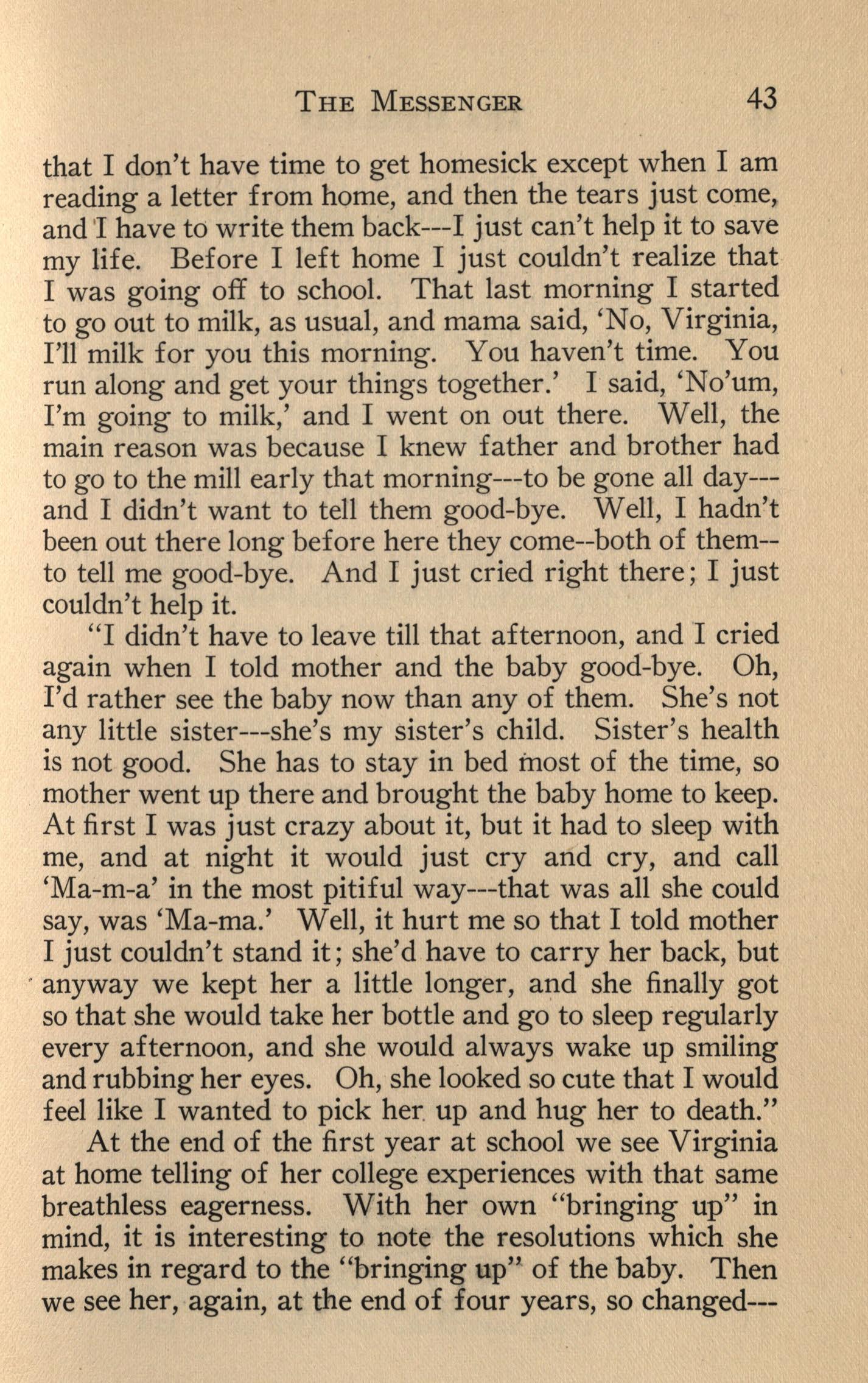
that I don't have time to get homesick except when I am reading a letter from home, and then the tears just come, and 'I have to write them back---I just can't help it to save my life. Before I left home I just couldn't realize that I was going off to school. That last morning I started to go out to milk, as usual, and mama said, 'No, Virginia, I'll milk for you this morning. You haven't time. You run along and get your things together.' I said, 'No'um, I'm going to milk,' and I went on out there. Well, the main reason was because I knew father and brother had to go to the mill early that morning---to be gone all day--and I didn't want to tell them good-bye. Well, I hadn't been out there long before here they come--both of them-to tell me good-bye. And I just cried right there; I just couldn't help it.
"I didn't have to leave till that afternoon, and I cried again when I told mother and the baby good-bye. Oh, I'd rather see the baby now than any of them. She's not any little sister---she's my sister's child. Sister's health is not good. She has to stay in bed most of the time, so mother went up there and brought the baby home to keep. At first I was just crazy about it, but it had to sleep with me, and at night it would just cry and cry, and call 'Ma-m-a' in the most pitiful way---that was all she could say, was 'Ma-ma.' Well, it hurt me so that I told mother I just couldn't stand it; she'd have to carry her back, but · anyway we kept her a little longer, and she finally got so that she would take her bottle and go to sleep regularly every afternoon, and she would always wake up smiling and rubbing her eyes. Oh, she looked so cute that I would feel like I wanted to pick her . up and hug her to death."
At the end of the first year at school we see Virginia at home telling of her college experiences with that same breathless eagerness. With her own "bringing up" in mind, it is interesting to note the resolutions which she makes in regard to the "bringing up'~ of the baby. Then we see her, again, at the end of four years, so changed---

and this is the most movirw part of the book. She, with her storehouse of systematized knowledge, is so much above her parents, and they, in turn, with a lifetime of experience behind them, are so much above her. Perhaps neither is above the other, but just different---so different that we wonder whether the girl's education has not been a tragedy as far as the family relationship is concerned.
In this story we have a delightful intermingling of pathos and humor. The book is so broad in its sympathies that it appeals equally to both the old and the new generation.
N OTE---Do not waste your time in searching for this novel in libraries, for it exists only in my imagination.

I'm sure you've often heard it said That naught is free but air we breathe, We have to announce a great discovery Of something more that is free. 'Tis poetry. We are so glad That some thing yet is free Even in these days of H. C. L. That we want all that we can get of it, The freer the better. Send it in.
All ye Spiders and Spideresses, Inspired by a girl's left eyebrow Or by a chunk of mud, We don't care.
Just send us poetry, NEW Poetry, FREE Poetry.
RITA M. BAKER, '24
Now the holidays are over And we are back again Running around in the same old grooves; With our New Year's resolutions All tied up and folded neatly away
(Here's hoping they get dusted once in a while), The question is What to do with the Christmas gifts
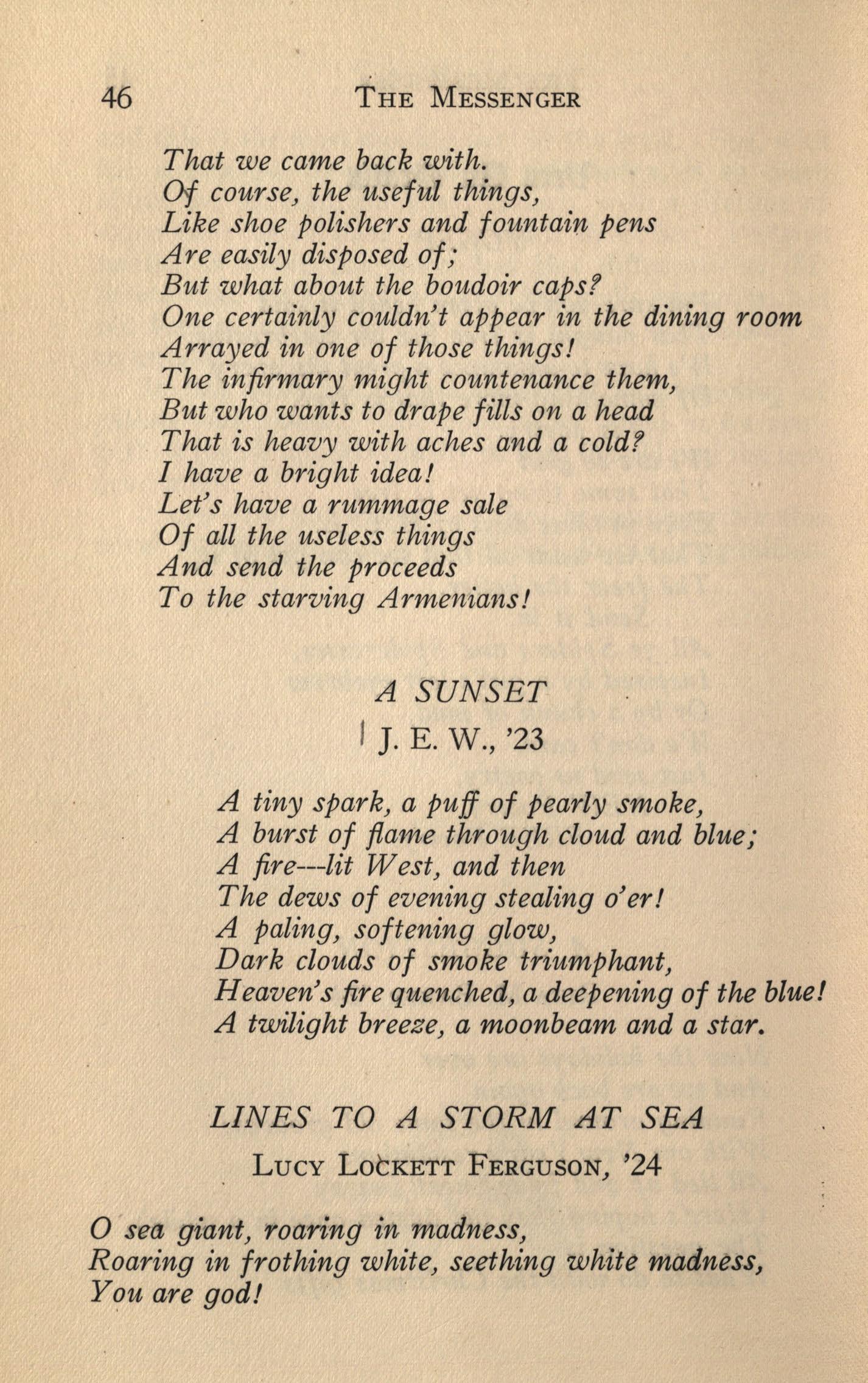
That we came back with.
Of course, the useful things, Like shoe polishers and fountairi pens
A re easily disposed of;
But what about the boudoir caps?
One certainly couldn't appear in the dining room
Arrayed in one of those things!
The infirmary might countenance them,
But who wants to drape fills on a head
That is heavy with aches and a cold?
I have a bright idea!
Let's have a rummage sale Of all the useless things
And send the proceeds
To the starving Armenians!
A tiny spark, a puff of pearly smoke, A burst of flame through cloud and blue; A fire---lit West, and then The dews of evening stealing o'er! A paling, softening glow, Dark clouds of smoke triumphant, Heaven's fire quenched, a deepening of the blue! A twilight breeze, a moonbeam and a star.
LOCKETT FERGUSON, '24
0 sea giant, roaring in madness, Roaring in frothing white, seething white madness, You are god! ·
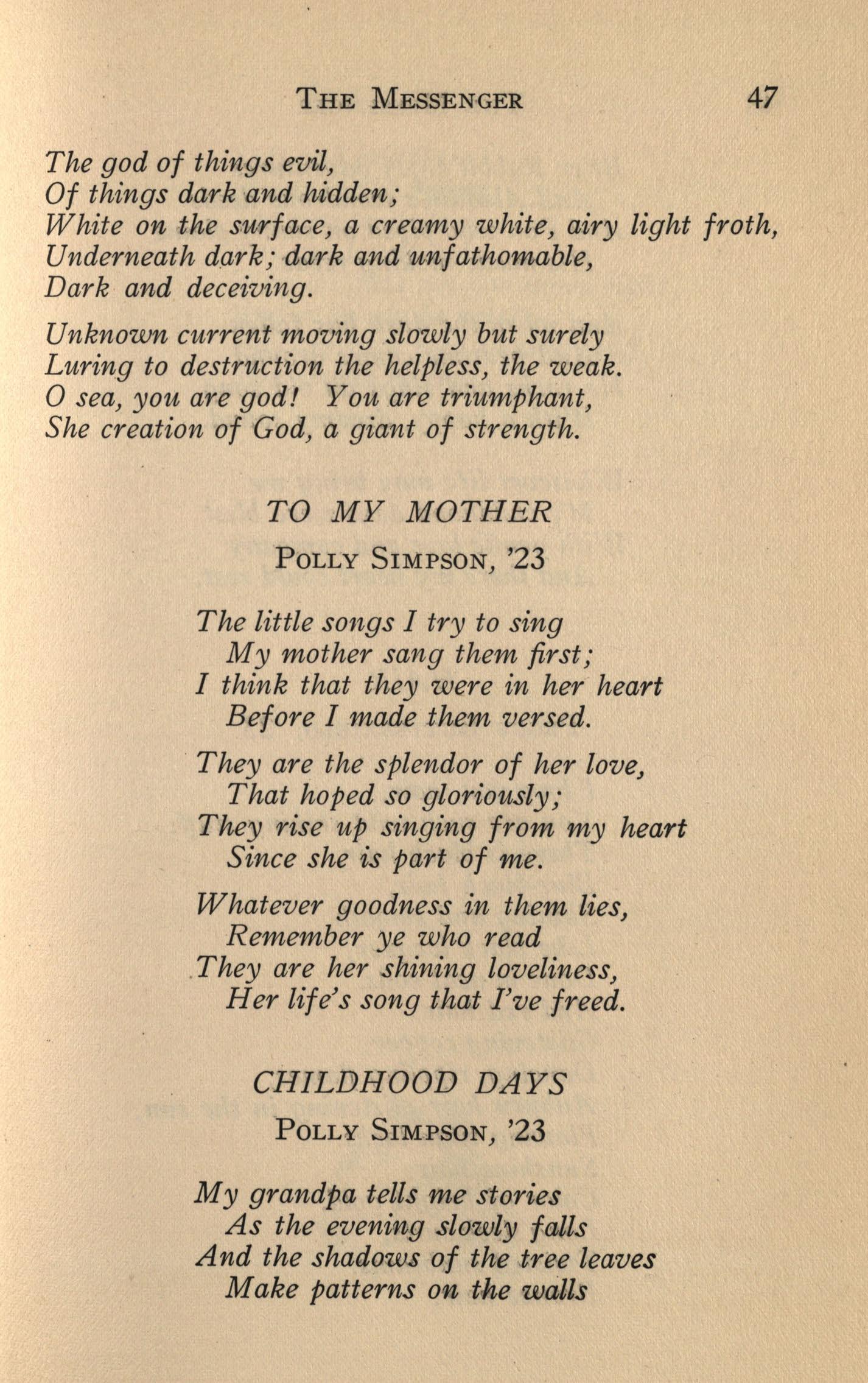
The god of things evil, Of things dark and hidden; White on the s,urface, a creamy white, airy light froth, Underneath dark; dark and unfathomable, Dark and deceiving.
Unknown current moving slowly but surely Luring to destruction the helpless, the weak. 0 sea, you are god! You are triumphant, She creation of God, a giant of strength.
POLLY SIMPSON, '23
The little songs I try to sing My mother sang them first; I think that they were in her heart Before I made them versed.
· They are the splendor of her love, That hoped so gloriously; They rise up singing from my heart Since she is part of me.
Whatever goodness in them lies, Remember y .e who read .They are her shining loveliness, Her life's song that I've freed.
POLLY SIMPSON, '23
My grandpa tells me stories As the evening slowly falls And the shadows of the ,tree leaves Make patterns on the walls
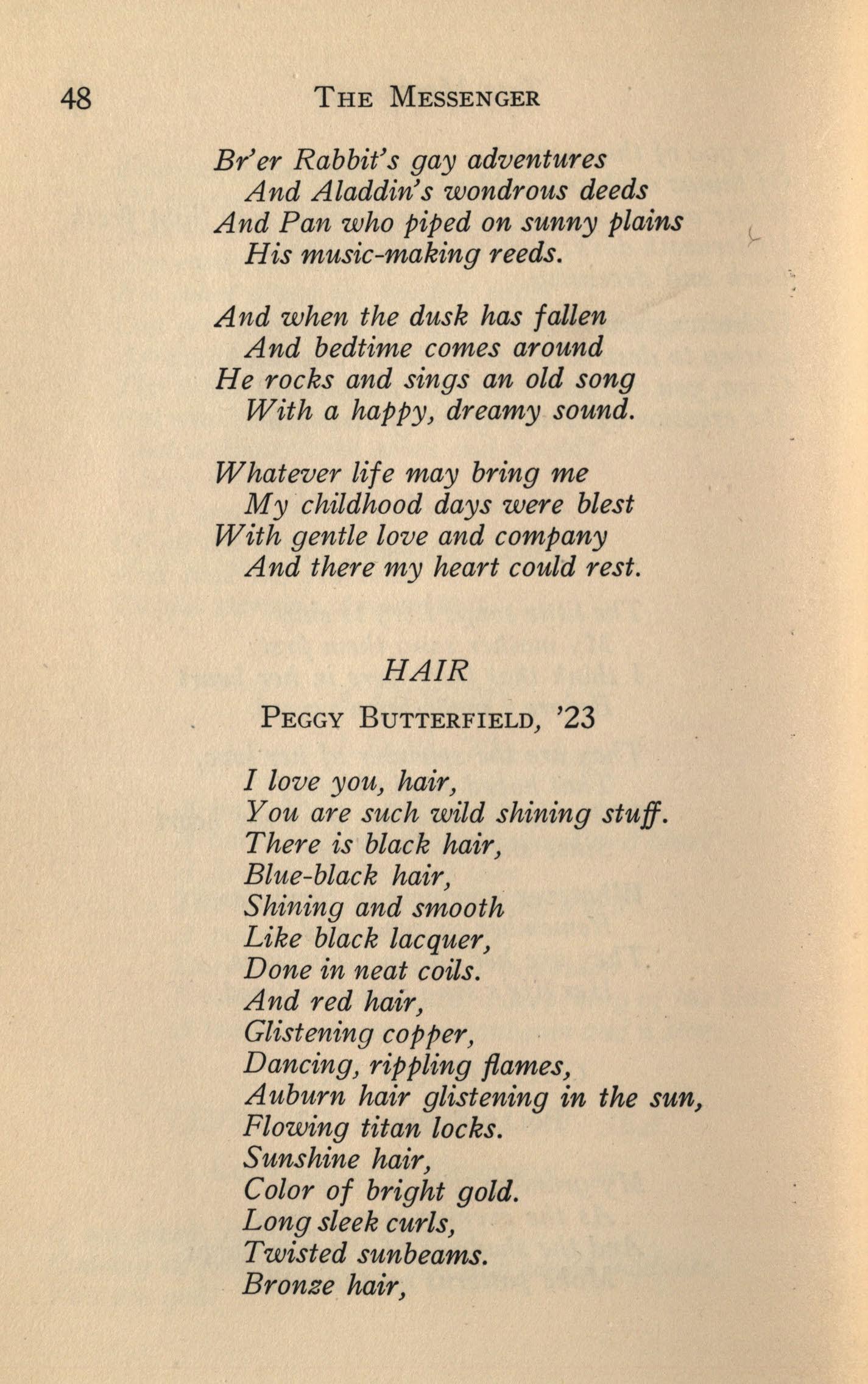
Br' er Rabbit's gay adventures And Aladdin's wondroits deeds And Pan who piped on sunny plains His music-making reeds.
And when the dusk has fallen And bedtime comes around He rocks and sings an old song With a happy, dreamy sound.
Whatever life may bring me
My childhood days were blest With gentle love and company And there my heart could rest.
I love you, hair, You are such wild shining stuff. There is black hair, Blue-black hair, Shining and smooth Like black lacquer, Done in neat coils. And red hair, Glistening copper, Dancing, rippling flames, Auburn hair glistening in the sun, Flowing titan locks. Sunshine hair, Color of bright gold. Long sleek curls, Twisted sunbeams. Bronze hair,
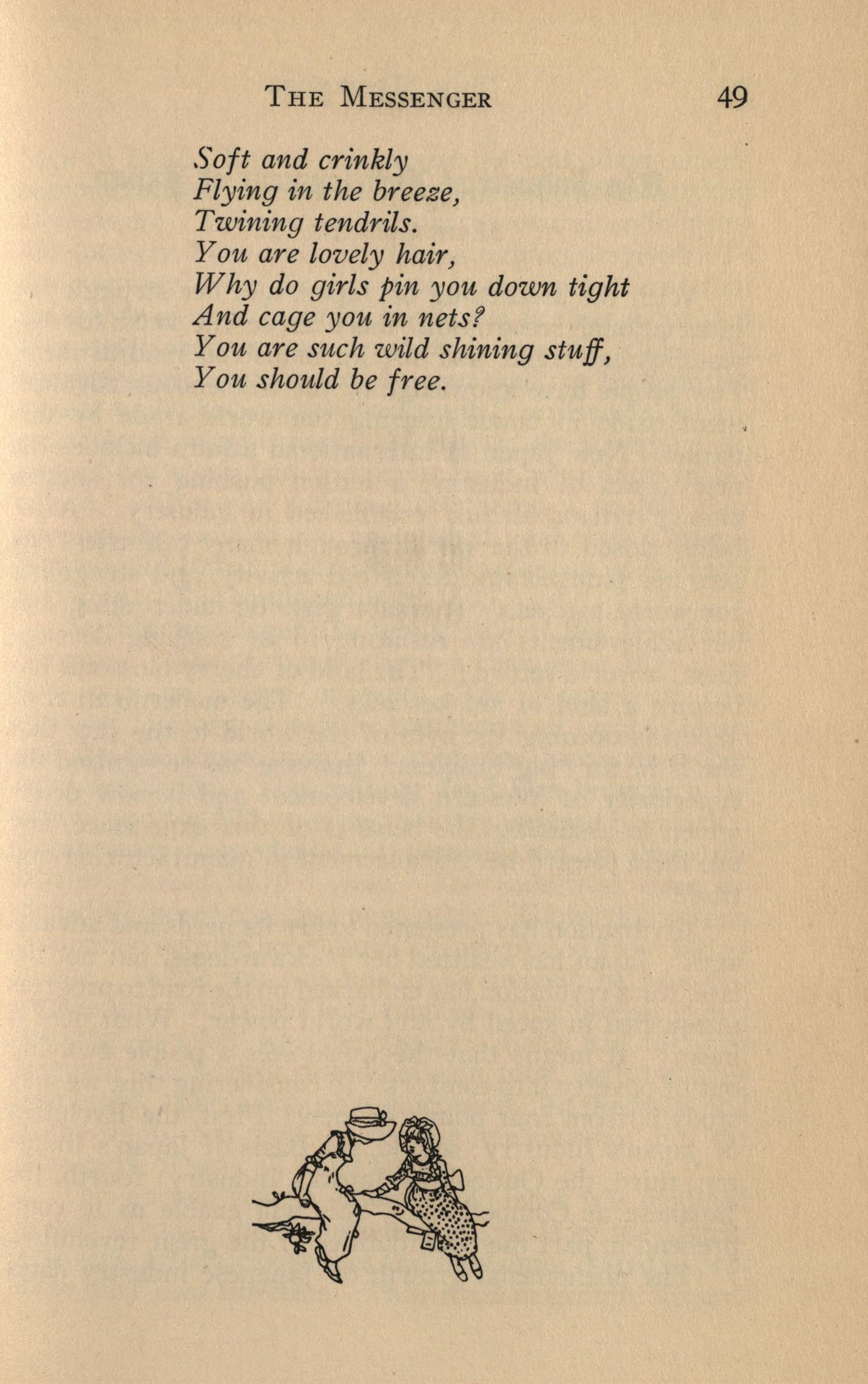
Soft and crinkly Flying in the breeze, Twining tendrils. You are lovely hair, Why do girls pin you down tight And cage you in nets? You are such wild shining stuff, You should be free.
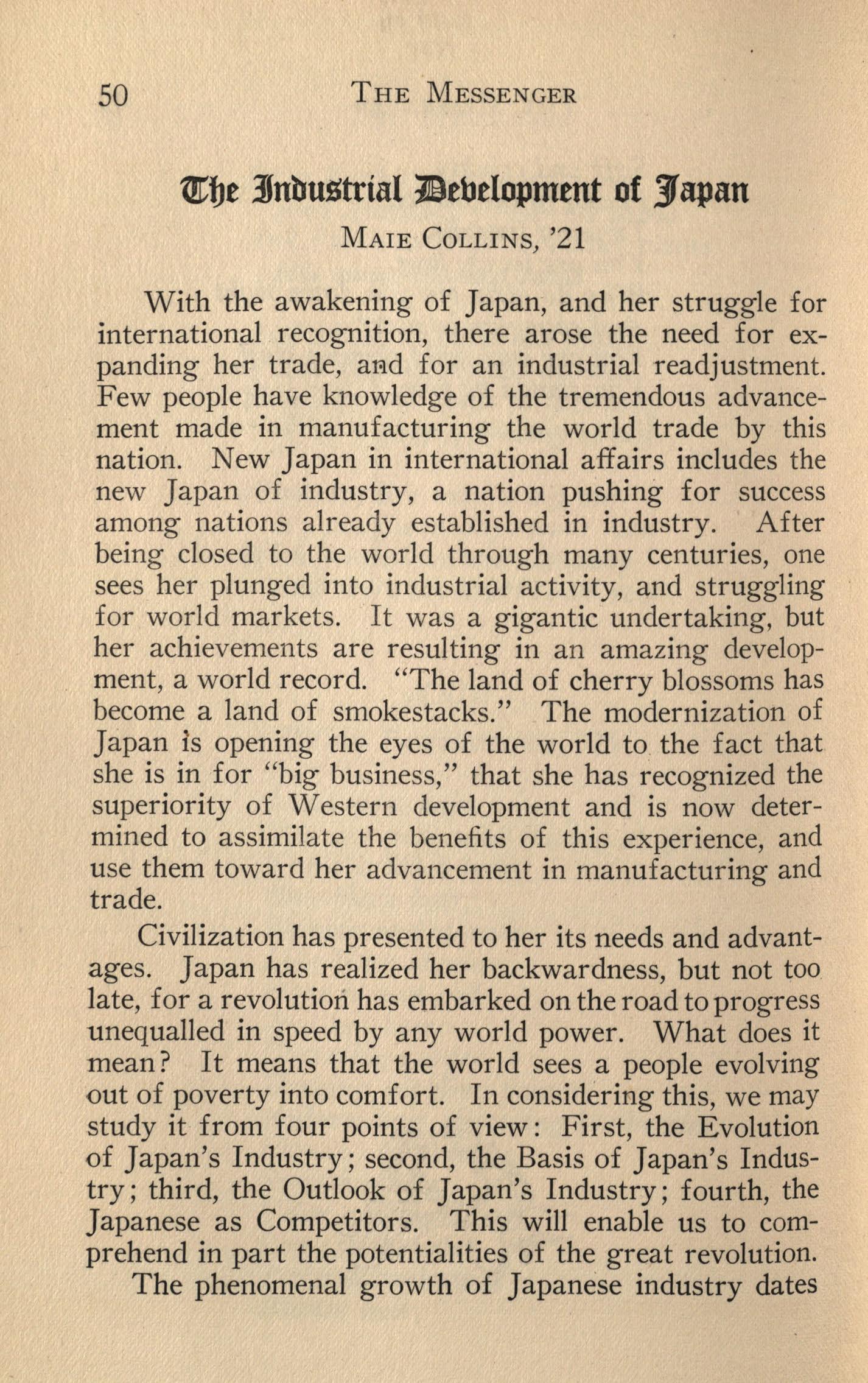
MAIE COLLINS, '21
With the awakening of Japan, and her struggle for international recognition, there arose the need for expanding her trade, aRd for an industrial readjustment. Few people have knowledge of the tremendous advancement made in manufacturing the world trade by this nation. New Japan in international affairs includes the new Japan of industry, a nation pushing for success among nations already established in industry. After being closed to the world through many centuries, one sees her plunged into industrial activity, and struggling for world markets. It was a gigantic undertaking, but her achievements are resulting in an amazing development, a world record. "The land of cherry blossoms has become a land of smokestacks." The modernization of Japan 1s opening the eyes of the world to . the fact that she is in for "big business," that she has recognized the superiority of Western development and is now determined to assimilate the benefits of this experience, and use them toward her advancement in manufacturing and trade.
Civilization has presented to her its needs and advantages. Japan has realized her backwardness, but not too late, for a revolution has embarked on the road to progress unequalled in speed by any world power. What does it mean? It means that the world sees a people evolving out of poverty into comfort. In considering this, we may study it from four points of view: First, the Evolution of Japan's Industry; second, the Basis of Japan's Industry; third, the Outlook of Japan's Industry; fourth, the Japanese as Competitors. This will enable us to comprehend in part the potentialities of the great revolution. The phenomenal growth of Japanese industry dates

back· to 1867. But to understand the real advancement, one must know something of the activities preceding this modern era. It is not to be inferred that since industry did not exist fifty years ago it was a thing despised. To the contrary, from the dawn of history one learns that the people were so intensely engrossed in their work that they took their names from their special trade. In ancient times a man would be seen walking through the streets with the word, "Blacksmith," written in Japanese script across his back. Moreover, the sovereign esteemed his work and specimens of it were kept in his palace. When the Japanese conquered a people, they adopted the skill of the vanquished, and thus Chinese, Korean and Indian civilization and processes were freely imported. This continued until 1603.
At this time began the feudal rule of the Tokugawa Shoguns. They brought about a change, in that freedom was no longer enjoyed. The founder of this dynasty, Iifezasu, closed the country to all foreign ideas, and for the succeeding three centuries Japan made her own civilization. This military feudalism brought a reaction, and for 300 years no industry enjoyed popularity. There were four classes of persons and of these the laborer ranked third lowest. The industrial class included all those belonging to no other. Under this system occupation became hereditary; a trade passed from father to son. If the son was unable to succeed, he was disowned and a successor was adopted. The largest group working together was the family. Each had his own spinning wheel, each raised his own food, each built his own home. There was no co-operation. In the fields and in the shops men used the crudest implements. For the most part, it was all hand labor.
This ancient system of household labor was modified in part through the introduction of guilds by the Dutch. Weavers, artists, carpenters and mechanics united to promote their own interests. They lived in groups, accord-
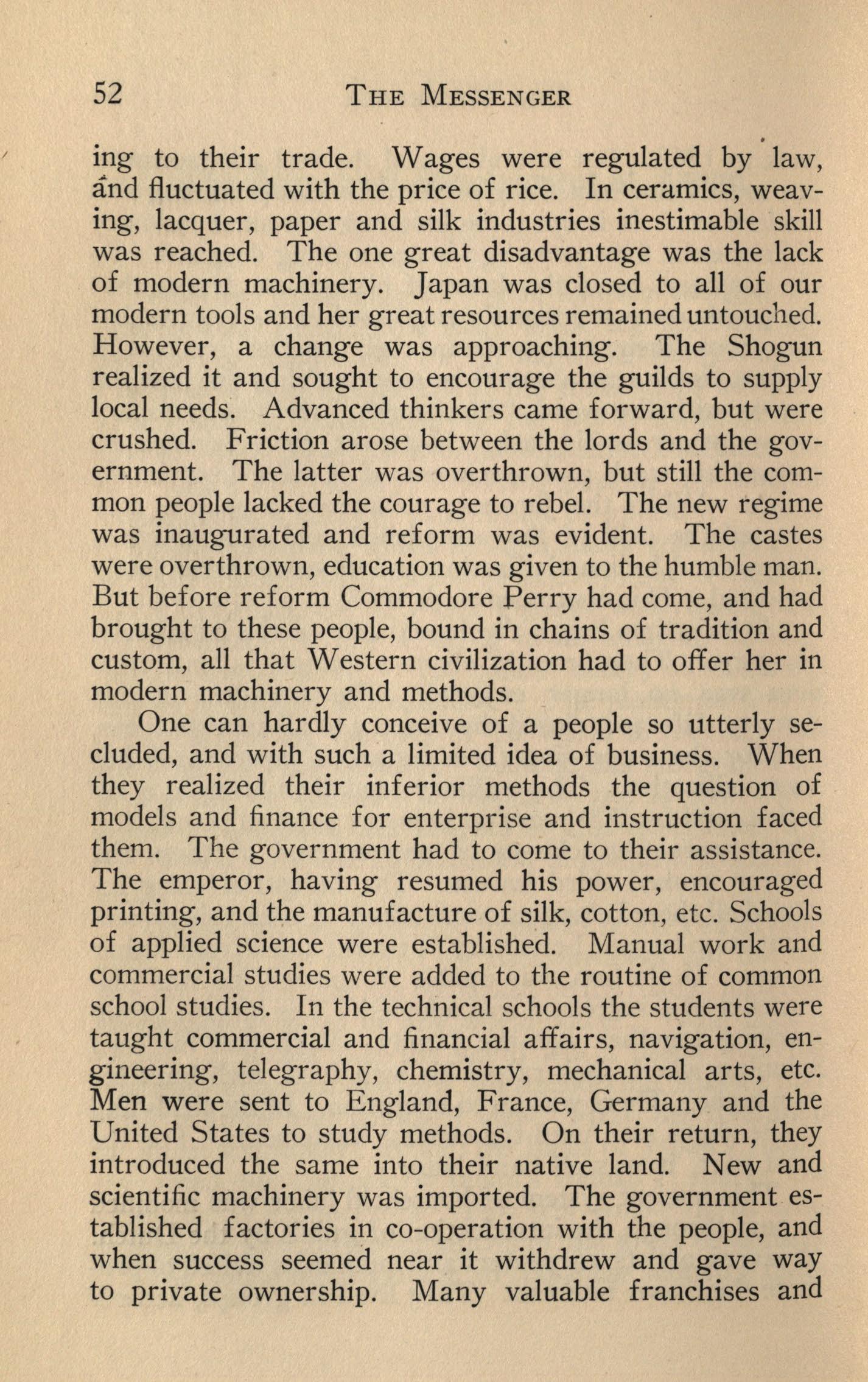
ing to their trade. Wages were regulated by law, and fluctuated with the price of rice. In ceramics, weaving, lacquer, paper and silk industries inestimable skill was reached. The one great disadvantage was the lack of modern machinery. Japan was closed to all of our modern tools and her great resources remained untouched. However, a change was approaching. The Shogun realized it and sought to encourage the guilds to supply local needs. Advanced thinkers came forward, but were crushed. Friction arose between the lords and the government. The latter was overthrown, but still the common people lacked the courage to rebel. The new regime was inaugurated and reform was evident. The castes were overthrown, education was given to the humble man. But before reform Commodore Perry had come, and had brought to these people, bound in chains of tradition and custom, all that Western civilization had to offer her in modern machinery and methods.
One can hardly conceive of a people so utterly secluded, and with such a limited idea of business. When they realized their inferior methods the question of models and finance for enterprise and instruction faced them. The government had to come to their assistance. The emperor, having resumed his power, encouraged printing, and the manufacture of silk, cotton, etc. Schools of applied science were established. Manual work and commercial studies were added to the routine of common school studies. In the technical schools the students were taught commercial and financial affairs, navigation, engineering, telegraphy, chemistry, mechanical arts, etc. Men were sent to England, France, Germany and the United States to study methods. On their return, they introduced the same into their native land. New and scientific machinery was imported. The government established factories in co-operation with the people, and when success seemed near it withdrew and gave way to private ownership. Many valuable franchises and

monopolies were granted chosen individuals to stimulate industry. The new departure along Western ideas was injurious to old domestic industries. Therefore, the government established a firm whose duty it was to familiarize foreign markets with the products of Japanese artisans, and to instruct the latter in adaptations likely to appeal to foreign tastes. Industry was readjusted and the results were stupendous. From 1897 the increase has been remarkable. The Chinese-Japanese War and the War with Russia checked industrial progress for a time, but the end of 1912 marked its revival. Someone has said that it passed through the dark ages in 1914, but turned the corner with the opening of 1915. In 1890, there were 125 factories; in 1920, there are 20,000. Formerly, there were 15,000 employees; today there are one million.
The people had become aware of their backwardness. The carpenters and artisans flocked to the factories. Here modern machinery awaited them. Resources were correspondingly developed. Mines were explored. Iron and steel were mined. Shipbuilding took on new life. The hand loom was abandoned, and the Japanese had their eyes opened by the rapid and efficient processes of machinery. Products unknown to them were introduced in the raw state and manufactured. Transportation was enhanced by railroads, ships and motor service. It was an awakening that took every conceivable form.
What has it proved? It has shown that the Japanese are excellent imitators, but lacking in creative genius. But even this has been an asset in the establishment of international industry and it has quickened progress. Besides this ability, they were aided by the government's refusal to allow the foreigner to enter and secure advantages. To understand this recent development and the impetus given to industries one has only to regard the attainment of a few characteristic industries. They may be classified as original or introduced. The former

include ceramics, weaving, lacquer, paper, leather, wood, camphor, salt, oil, tobacco and raw silk. The mechanical arts can be traced to the very dawn of history, when the family worked together and the feudal lord was expected to purchase the highest grade work produced under him. Now they have middlemen, standing between the artisan and public markets, who buy for local and export trade. There are 17,813 persons engaged in the manufacture of lacquer ware. The value of the output amounts to $4,520,000 annually. The introduction of Korean pottery has meant renown. Another old industry is the manufacture of paper, which is made from plants and used for furniture, raincoats, napkins and window panes. Wicker work is manufactured in both households and factories. Spinning and weaving have for centuries been the most important native industries. In 1889 there were one million weavers and a spinning loom was kept busy all day in every home. Today modern appliances and cotton spinners have replaced them, and the home-spun is almost unknown.
Asaka is the great cotton center. ·Raw cotton is imported from the United States and India, and the textile exports take the form of linen, duck, flannel, muslin, serge and woolens. Five plants turn out twelve million yards of linen cloth and seventeen million pounds of yarn. Men, women and children keep the hum of the machine going night and day in one of the biggest industries of Japan. Silk is manufactured by modern equipment and figures as one of her biggest exports. Thus, the revolution has modernized her original industries. The introduced industries include shipbuilding, mining, electrics, oils, chemicals, leather and countless others. These have been advanced under the influence of a paternal government. The European War gave an impetus to these, and increased the wealth of her people. The original industries represent her real ability. The introduced show no invention, for they are concerned in the development throughout the land, and in catching up

with the modern world. Iron and steel manufacture are questions of great concern. In 1917 in To}<yo,a city of the size of Chicago, all local transportation was on horse and by the Japanese coolie. It took four hours to get a package delivered a half mile from its destination. There was only one fire engine in the empire. This gives an idea of her need. Today they are manufacturing farm implements, marine engines and countless other things from iron and steel. Coal is scarce, but recently Manchuria has presented to her some excellent advantages for mining. There are 9,500 mines. The owner of land does not own the mine unless he develops it. The first applicant for prospecting is granted the right. If the owner desires to use the surface, he is furnished elsewhere. For the most part, this industry lacks modern machinery.
In the domain of electrics, one notes that water plants are numerous and widely distributed. The shallow streams, long regarded as sources of trouble, are being rapidly turned into sources of electric power. There is a great boom in electrics. There are two large factories, one in connection with the General Electric Company, of the United States, and the great lamp factories located at Kawasaki and Osaka. Telephones and telegraphs are government monopolies. As yet there are no automatic exchanges in the telephone service, but female operators are worked to the limit. There are no electric irons, utensils, heaters, fans, etc. The rubber works still remain a part of this business.
Shipbuilding is carried on extensively at Osaka, Nagasaki and Kawasaki. The yards are equipped with the best appliances and their standard is high. Service on the ships ranks second to none in the world, and her ships enter all world ports. There are over 200 yards, and these show an increase from 125 in 1803 to 20,000 ships in 1917. The demand for timber resulted in ruthless cutting of her forests. Scientific methods now regulate this abuse. Forestry is taught in sixty institutions.
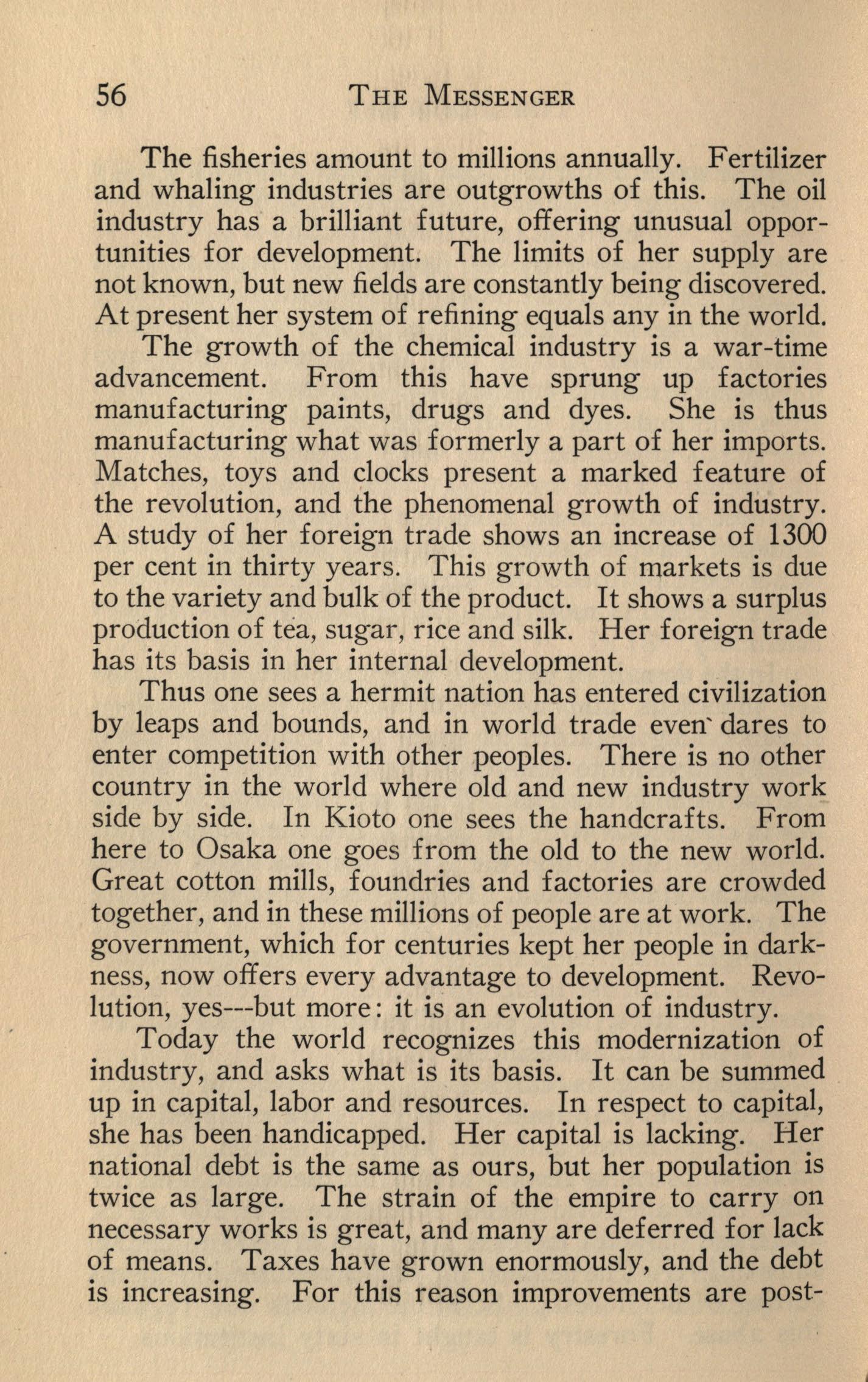
The fisheries amount to millions annually. Fertilizer and whaling industries are outgrowths of this. The oil industry has a brilliant future, offering unusual opportunities for development. The limits of her supply are not known, but new fields are constantly being discovered. At present her system of refining equals any in the world. The growth of the chemical industry is a war-time advancement. From this have sprung up factories manufacturing paints, drugs and dyes. She is thus manufacturing what was formerly a part of her imports. Matches, toys and clocks present a marked feature of the revolution, and the phenomenal growth of industry. A study of her foreign trade shows an increase of 1300 per cent in thirty years. This growth of markets is due to the variety and bulk of the product. It shows a surplus production of tea, sugar, rice and silk. Her foreign trade has its basis in her internal development. Thus one sees a hermit nation has entered civilization by leaps and bounds, and in world trade even' dares to enter competition with other peoples. There is no other country in the world where old and new industry work side by side. In Kioto one sees the handcrafts. From here to Osaka one goes from the old to the new world. Great cotton mills, foundries and factories are crowded together, and in these millions of people are at work. The government, which for centuries kept her people in darkness, now offers every advantage to development. Revolution, yes---but more: it is an evolution of industry. Today the world recognizes this modernization of industry, and asks what is its basis. It can be summed up in capital, labor and resources. In respect to capital, she has been handicapped. Her capital is lacking. Her national debt is the same as ours, but her population is twice as large. The strain of the empire to carry on necessary works is great, and many are deferred for lack of means. Taxes have grown enormously, and the debt is increasing. For this reason improvements are post-
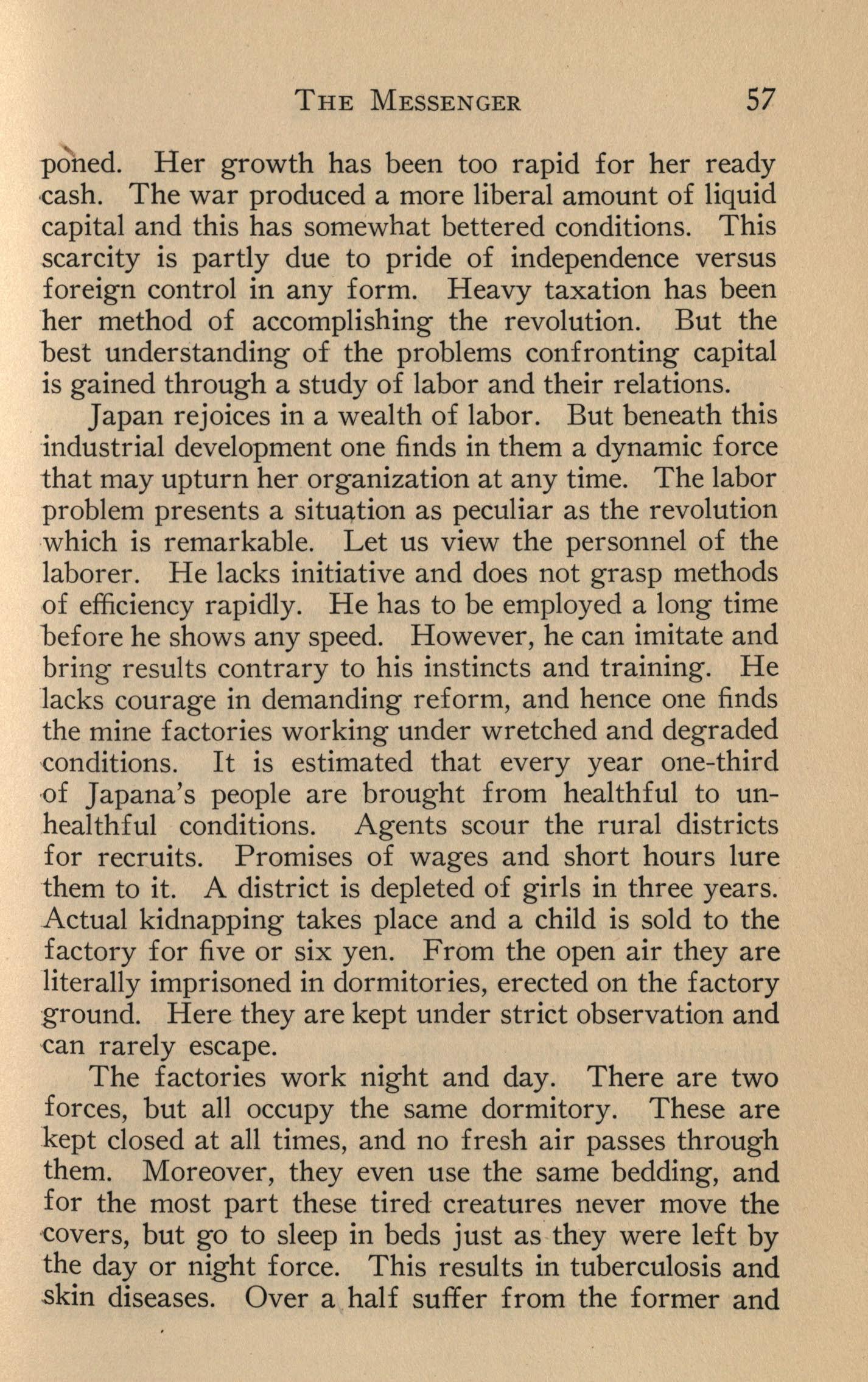
poned. Her growth has been too rapid for her ready ,cash. The war produced a more liberal amount of liquid capital and this has somewhat bettered conditions. This scarcity is partly due to pride of independence versus foreign control in any form. Heavy taxation has been ·her method of accomplishing the revolution. But the best understanding of the problems confronting capital is gained through a study of labor and their relations.
Japan rejoices in a wealth of labor. But beneath this industrial development one finds in them a dynamic force that may upturn her organization at any time. The labor problem presents a situq.tion as peculiar as the revolution which is remarkable. Let us view the personnel of the laborer. He lacks initiative and does not grasp methods of efficiency rapidly. He has to be employed a long time before he shows any speed. However, he can imitate and bring results contrary to his instincts and training. He 'lacks courage in demanding reform, and hence one finds the mine factories working under wretched and degraded ·conditions. It is estimated that every year one-third ,of Japana's people are brought from healthful to unhealthful conditions. Agents scour the rural districts for recruits. Promises of wages and short hours lure them to it. A district is depleted of girls in three years. Actual kidnapping takes place and a child is sold to the factory for five or six yen. From the open air they are literally imprisoned in dormitories, erected on the factory ground. Here they are kept under strict observation and -can rarely escape.
The factories work night and day. There are two forces, but all occupy the same dormitory. These are kept closed at all times, and no fresh air passes through them. Moreover, they even use the same bedding, and for the most part these tired creatures never move the -covers, but go to sleep in beds just as they were left by the day or night force. This results in tuberculosis and skin diseases. Over a half suffer from the former and

six months is the longest time that they remain in one factory. Women and children form the bu lk of t h e laboring class. They average twelve hours per day, with a half hour for lunch, but for fear of displeasing the foreman, the latter is rarely taken. It generally amounts to seven or eight minutes standing by the machines. Girls . not in the teens arise at 4 :30 A. M. and work until 6 :00. The factories are dark , c ro w ded and poorly ventilated . There is little provision for cleanliness, and accidents are frequent. From their work they go immediately -to bed in dormitories in which thirty or forty occupy a single room. Almost all the factories advertise reforms in forms of pleasure and recreation, but the girls are so tir ed that they cannot enjoy or use such.
What are the compensations of this grind? The answer to thi s question is the most alarming fact of the problem. In the factories where the use of the dormitories is required, the wage amounts to three and one-half cents. In the cotton mills thirteen and one-half cents per day is paid to women and twenty-two cents to men. It is understood that their money has a different value from ours, hut in recognition of high taxes and the H. C. L. one feels that this amounts to little.
But, more than this, let one see the havoc it is working on Japanese life. Sixty per cent of those recruited from the country never return. What happens to them?' First, the factories present dangers in themselves. In the toy factories the celluloid dust fills their lungs and tuberculosis .results. In the glass factory exposure to intense heat and light causes prostration and eye diseases. In the mines the rate of accident is 22.7 per cent to that of 5.83 per cent in the United States. One out of every six has tuberculosis. This is introduced throughout the · country when they return to the rural districts. Deaths equal the births. Prostitution is common. Drunkedness and crime are great evils, and suicide is a growingproblem. Someone has said that 200,000 new girls are
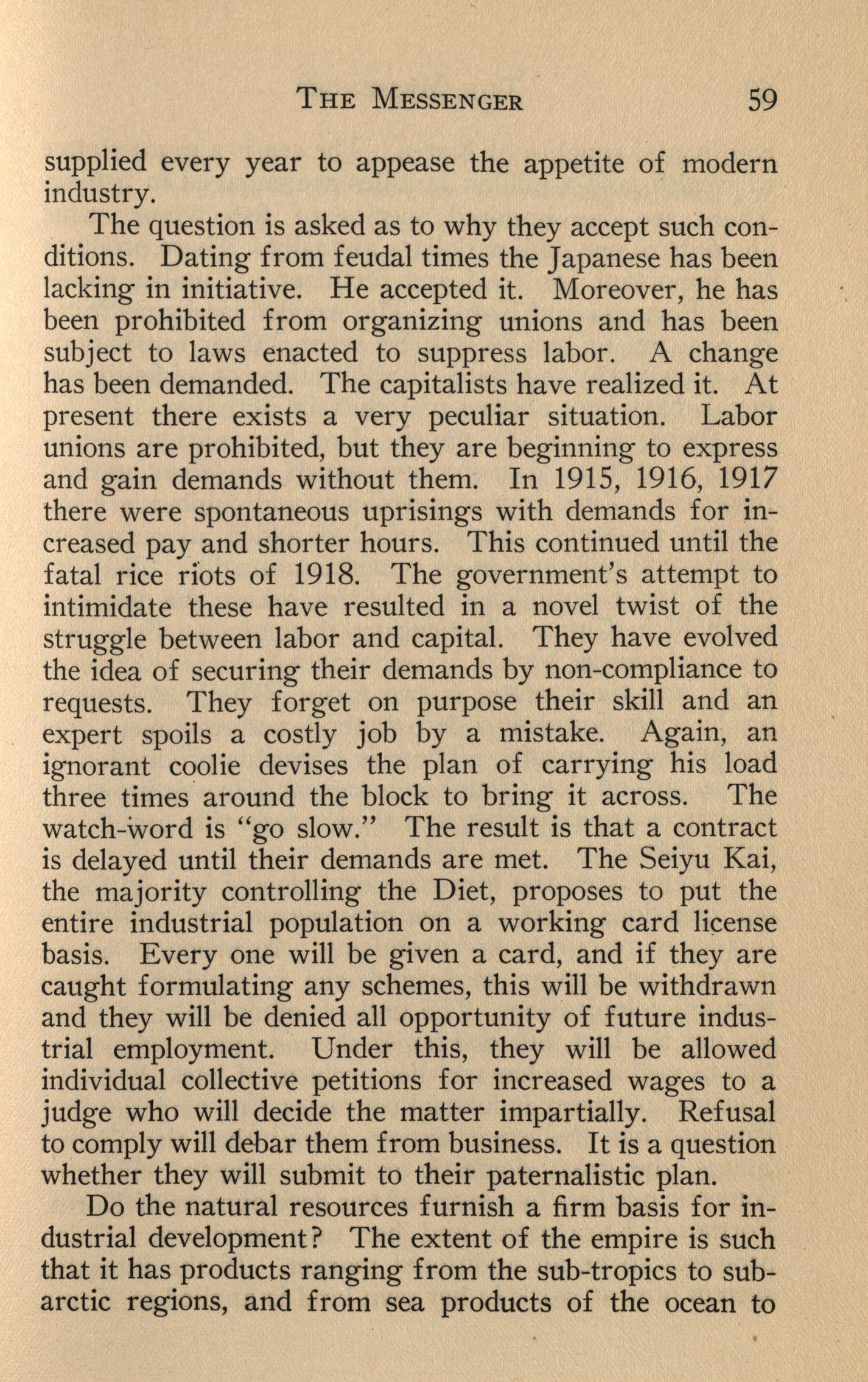
supplied every year to appease the appetite of modern industry.
The question is asked as to why they accept such conditions. Dating from feudal times the Japanese has been lacking in initiative. He accepted it. Moreover, he has been prohibited from organizing unions and has been subject to laws enacted to suppress labor. A change has been demanded. The capitalists have realized it. At present there exists a very peculiar situation. Labor unions are prohibited, but they are beginning to express and gain demands without them. In 1915, 1916, 1917 there were spontaneous uprisings with demands for increased pay and shorter hours. This continued until the fatal rice riots of 1918. The government's attempt to intimidate these have resulted in a novel twist of the struggle between labor and capital. They have evolved the idea of securing their demands by non-compliance to requests. They forget on purpose their skill and an expert spoils a costly job by a mistake. Again, an ignorant coolie devises the plan of carrying his load three times around the block to bring it across. The watch-word is "go slow."
The result is that a contract is delayed until their demands are met. The Seiyu Kai, the majority controlling the Diet, proposes to put the entire industrial population on a working card lkense basis. Every one will be given a card, and if they are caught formulating any schemes, this will be withdrawn and they will be denied all opportunity of future industrial employment. Under this, they will be allowed individual collective petitions for increased wages to a judge who will decide the matter impartially. Refusal to comply will debar them from business. It is a question whether they will submit to their paternalistic plan. Do the natural resources furnish a firm basis for industrial development? The extent of the empire is such that it has products ranging from the sub-tropics to subarctic regions, and from sea products of the ocean to
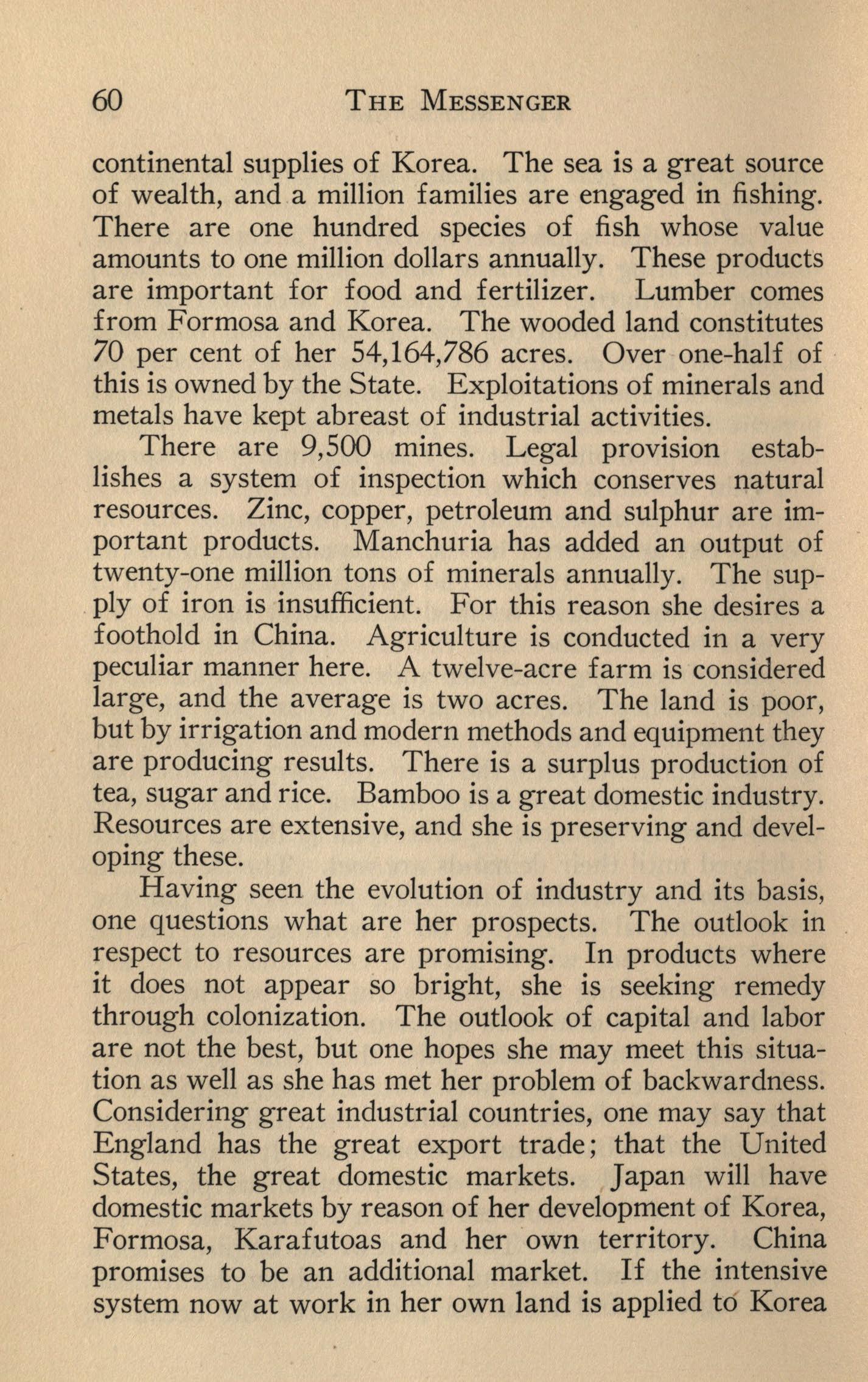
continental supplies of Korea. The sea is a great source of wealth, and a million families are engaged in fishing. There are one hundred species of fish whose value amounts to one million dollars annually. These products are important for food and fertilizer. Lumber comes from Formosa and Korea. The wooded land constitutes 70 per cent of her 54,164,786 acres. Over one-half of this is owned by the State. Exploitations of minerals and metals have kept abreast of industrial activities. There are 9,500 mines. Legal provision establishes a system of inspection which conserves natural resources. Zinc, copper, petroleum and sulphur are important products. Manchuria has added an output of twenty-one million tons of minerals annually. The sup. ply of iron is insufficient. For this reason she desires a foothold in China. Agriculture is conducted in a very peculiar manner here. A twelve-acre farm is considered large, and the average is two acres. The land is poor, but by irrigation and modern methods and equipment they are producing results. There is a surplus production of tea, sugar and rice. Bamboo is a great domestic industry. Resources are extensive, and she is preserving and developing these.
Having seen the evolution of industry and its basis, one questions what are her prospects. The outlook in respect to resources are promising. In products where it does not appear so bright, she is seeking remedy through colonization. The outlook of capital and labor are not the best, but one hopes she may meet this situation as well as she has met her problem of backwardness. Considering great industrial countries, one may say that England has the great export trade; that the United States, the great domestic markets. Japan will have domestic markets by reason of her development of Korea, Formosa, Karafutoas and her own territory. China promises to be an additional market. If the intensive system now at work in her own land is applied to Korea

and Formosa, there cannot fail to come to her great wealth. The world can look for a growing demand for Japanese industry. Handcrafts will grow and expand, and modern machinery promises to make her a foremost nation in the world of industry and trade. With such a bright future, what is her position as a competitor? One can say that for the most part she will supply her own needs. Thus the trade of other countries will decrease in the loss of this market. Since China will supply the cotton formerly supplied by the United States, the latter will lose. However, the development has already taken place and promises to continue to increase the need of Japan for things she does not make. The growth of the "junker" or manakin class and their desire for luxuries has already forced her to buy. The current opinion is that she cannot be a competitor now due to her weak economic basis. Again, there is the problem of surplus population. Moreover, they lack ethics in trade. Their first orders were so popular that there was a prompt renewal. This caused adulteration, shortage in weights, substitutions of inferior materials and defective workmanship. Although the government has taken it over, they will have to have some time in re-establishing their standard. Although we cannot say that they will be our competitors in the near future, we must recognize that they are closing the markets of the Western world to Asiatic markets. Tariff is keeping us in business. Industry with them is now in a subnormal condition. The development has been rapid, and if it continues she promises to be a factor in world commerce. The world recognizes her phenomenal growth. How will the world face this industrial development of modern Japan? Will she allow a country which was fifty years behind her in development to be her competitor?
The poetry in the Wellesley Magazine is particularly good. One of the best is "Dawn," by Hildegarde E. Churchill. The best short story in this issue is "Romance Versus Billy" by Catherine Brash. We notice also an interesting serial, a good article on Conrad's "Youth" and some Book Reviews.
"Mrs. Dean's Device" is a very clever little play and "The Uttermost Parts of the Sea" is a rather unusual and quite interesting story. There are several articles written in a chatty, easy style.
•
THE AcoRN OF MEREDITHCOLLEGEis particularly noteworthy for its well balanced contents.

In THE LESLIANHERALDOF Hoon COLLEGEthere is a department called the Theme Corner, which we might do well to imitate. There are many Freshman themes which are really worthy of print, but for which we have heretofore had no suitable corner which would find their place there.